#I mean from a narrative perspective it does make sense why her household has such a very specific script
Explore tagged Tumblr posts
Text
One thing I've noticed while playing the Sims 2 in storymode.
Is that with any other Sim I never get back from work earlier if they get demoted or fired, yet I only see this happening to Mary-Sue Pleasant
Considering you can actually play the household in a specific order to build the story, imagine if by following this, Mary-Sue began to suspect Ned Fulmer Daniel since the fiasco at Cassandra's house.
Mary-Sue witnessed that Dina, Nina and Kaylynn were involved with Don, who ran away from the wedding. She couldn't get out of her head that Kaylynn, her maid, was involved with an engaged man.
Her gut telling her something is wrong is what makes her either get demoted or fired from her work since she can't focus at all, with a heartbroken best friend, the maid involved in the drama with taken men, she confirms her suspictions when she comes back and caughts Daniel in the act.
#mary sue pleasant#daniel pleasant#the sims 2#kaylynn langerak#cassandra goth#dina caliente#nina caliente#pleasantview#ts2 premades#don lothario#I mean from a narrative perspective it does make sense why her household has such a very specific script#talking about it with my boyfriend who is a videogame script writer made us both realize how this perfectly fits#with the wedding fiasco. Don's nature and Kaylynn being involved despite there are other generated maids in town#and yes the game is made so Mary Sue comes early from work to catch Daniel after following the game suggestions#but imagine the workaholic mary sue getting her wake up call at Cassandra's. connecting the dots at work
25 notes
·
View notes
Text
Why do I love The Seven Dials Mystery more than the similar in many aspects and slightly more well-known Why Didn't They Ask Evans?
(CAREFUL, hints of the villains' identities ahead)
These novels do indeed have many similarities: they both belong to Dame Agatha's early adventure mysteries, they are full of humour, they have a cute hero couple consisting of a dashing girl and calmer humble boy and a villain couple consisting of a charming rascal and a pseudo-gentle damsel. They were even adapted to film by same filmmakers one immediately after the other and had some same actors involved.
I do enjoy Why Didn't They Ask Evans? too, it's good fun, but there are several reasons why I have warmer feelings for The Seven Dials Mystery:
First. Besides being fun, The Seven Dials Mystery also gave some good serious potential you don't realize immediately. The story of the victims and why they died turns out to be surprisingly realistic, a story of romanticized adventure dreams of inexperienced youth meeting harsher reality and betrayal. The main investigation by the central heroes also takes an unexpectedly realistic tone to the end, and has dramatic potential. The novel does a very good job at deconstructing spy novel cliches. Why Didn't They Ask Evans? doesn't have such a layer.
Second. The mystery itself. In SDM the solution turns everything on its head while making perfect sense, Dame Agatha even does one of her special tricks of letting us see glimpses of the main villain's (and occasionally their ally's) thoughts and perspectives and sincere conversations between them while making the wording so ambiguous that a naive reader sees nothing when it's just under their nose. In WDTAE, the identity of at least one of the villains is pretty clear almost from the start even to the characters until they get briefly distracted with a false lead, and there's no such play with POV snippets and ambiguous dialogue.
Third. The heroes' motivation. In SDM, they actually have stakes to be involved - Bill was close friends with the victims, Bundle gets pulled into it by fate strongly when the first death happens in her house, the second literally in her arms, and she gets hold on really important information about both (and the victims are connected to her friend/household circle). In WDTAE, Bobby witnesses a death of a stranger but becomes actually involved into anything when an attempt at his life is made (for no good reason, he wouldn't be able to prove anything actually incriminating to the villains at this point, meaning they just dug their own graves) and Frankie is in it mostly out of curiosity.
Fourth. The heroes' narrative. In SDM, we see most of things from Bundle's POV, and Bill stays in background because he's narratively supposed to, he has much more important information than we are allowed to know at the start, which plays a crucial role in the culmination, and in the final he finally is able to tell his part of the story. In WDTAE, we have focus on both heroes' adventures, but if I recall right we aren't allowed in Frankie's thoughts, only Bobby's. (I once encountered a fan work/alternative analysis where Frankie is the villain's accomplice instead of the canon one, and I couldn't help but noticing I can't really prove otherwise... For reasons described in the next paragraph too)
Fifth. The main romance. Bundle and Bill, just like Bobby and Frankie, are childhood friends who develop romantic feelings for each other during the story. But Bundle and Bill kind of... feel more natural? There's Bundle's slight prickling of jealousy when Bill seems to be infatuated with other women (he actually isn't) but she still finds him adorable even if mildly annoyed at his "silliness", Bill being indignant and protective when Bundle is courted by an elderly arrogant official (whom she absolutely doesn't like), Bill adoring Bundle and being afraid to confess for low self-esteem reasons and confessing when emotional during the final. In WDTAE, the ship is externally complicated with the heroes crushing on other people, who just so turn out to be the villains, as well as stereotypes for "attractiveness to the other gender" (a Charming Bad Boy and a Damsel In Distress). The chemistry the heroes have to the alternative love interests looks in fact so genuine that - if those two weren't secretly evil, would the heroes come to romantically like each other? Especially considering that the alternative LIs seem to develop/expand out of the stereotypes, the guy "showing a caring side for his family", the girl "showing a brave side" (yes after all it was all an act, but if it wasn't? They would have no issues becoming healthy couples with the heroes)
Sixth. The villains' romance. The villain couple from SDM genuinely are devoted to each other, while those from WDTAE betray each other without an issue in the end. Also, in SDM they actively interact on screen and have their dynamics shown, while in WDTAE they don't. And like I already said the SDM villains are more defined as individuals due to their POVs being shown at times, which WDTAE doesn't do.
Seventh. The suspension of disbelief. The SDM story while having its minor holes is not that implausible. Plot-relevant coincidences happen mostly to start a plotline, not to resolve it. But WDTAE relies on coincidences a bit too much. Especially when there's a tense scene where the heroes are captured by one of the villains and escape due to... right, incredible coincidence. During my first read I was hoping that Bobby's friend happened to be there not accidentally, that like Bill from SDM he's smarter than he looks and was having their backs secretly the entire time - but nope. It was literally a non-foreshadowed accident with no dramatic/character potential. And this isn't the first incredible coincidence that could be easily avoided (the attempt to poison Bobby failing because he turned out to have incredible natural immunity to the poison? Even in the modern film adaptation they did better by simply having him vomit the poison).
Eighth. The humour. In addition to humouristic scenes and dialogues with the central characters (Bundle, Jimmy and Bill and occasionally Superintendent Battle's irony), SDM has a lot of colourful and fun supporting characters written in best traditions of English humour (Lord Caterham, the Cootes, Rupert Bateman, George Lomax, Socks Daventry, the gardener at the Chimneys, Jimmy's manservant, Bundle's aunt). WDTAE has humour mostly in the protagonist dialogue (plus Roger), two small scenes of protagonists talking to their fathers in the early chapters, and some situational comedy when Bobby inquires Sylvia's acquaintance when impersonating a lawyer, and I think that's it. Not going to say WDTAE did it bad, it did pretty good, but the SDM humour feels to me more... nuanced? And more diverse?
Overall, in my opinion, SDM does everything that WDTAE does but does it better, and does more than the latter.
5 notes
·
View notes
Text
House of Leaves, Chapter 13
Another rich chapter. This one was titled, too. Before Zampanò erased all reference to the labyrinth.
These poor kids, man... It's not enough they have to live in a rhetorical device for their parents' issues, but they have to go to school on top of it all. And now watch as dead and dying men they saw just a week-and-some-change ago get vaulted onto the living room floor.
It seems like I have an answer of a sort as to why the Spiral Staircase got so big. Karen's packing to leave coincides at about the same time as the stretch.¹ It's a total collapse of communication on all fronts. Y'know, in a way everyone is in their own bewildering little house at this moment. One that's twisting, unsure, and endlessly possible but infinitely obfuscating. Brookes, a teacher at the children's school, walks into the house looking for answers and is met with confusion. Like Holloway, when there are no answers, ends, or goals. Like Karen, who has infinite choice on where and how to go, but by that same token makes it impossible to plan. Like Tom, bereft of a brother. Like the police who walk into a mystery they simply cannot solve in a household they don't understand.
To me the house has a component of the terror of infinite possibility. If you're an artist of any sort, maybe you'll understand. Has anyone ever told you to just draw anything? Draw whatever you like. Because now, well, what's the right thing to draw? What is the best use of your time? What ages-old idea will you resurrect when you have time for one? In these situations I find having infinite choices is the same as having none, both beget a certain kind of paralysis.
Anyway. The uh, the book. Let's see what's next I'm sure it's answers about Hallway an-
Hi. Johnny. My man's so far gone he's nailing tape measures up in his room.² I didn't expect Lude to be the one to give him his figurative light, though. It's narrative as fuck. He's literally giving Johnny a guiding light, his way out, and Johnny just can't do it.
And then there's this bit here that I like.³ Johnny talking about how without the story, he would cease to exist. And it's completely true. He has interposed himself into it and he's now a part of it from my perspective. In the complete sense, he is a character in the story in my hands. Like some fly trapped in a piece of amber I'm holding.
In a way, I guess I'm also part of this story now. My musings are added to the book. Maeve's interludes where she talks about her feelings and gripes at Johnny. There's something about that that should frighten me, but I actually think it's really sweet. Even if my words are only seen by a handful of people, to them, to you I am every bit the same character as Will, Karen, or Johnny. I exist on paper, in relation to this story. At least until I move on to my next book. But these words, my bit part, will remain. As will everyone else's who writes about House of Leaves.
I got... very sidetracked. Pardon me.
Navidson's escape. The book seems a bit insistent on coding Holloway as the Minotaur. But what I find striking is that he's simply not. He's much more in line with Zampanò's small take on the man-bull.⁴ Someone dispossessed for inadequacy. The labyrinth is his home, it keeps him safe. It gives him the visage of a brave adventurer. I'm sure there are allusions and themes with Elizabeth and the doe but I'm not too picky about them. I more find it interesting that he took his own life in the house. Moon above that sounds horrific worded like that. I mean that there are two ways it could be read. Either as a definite end to the infinite using the only thing he had control over, or... Or the labyrinth took him as its Minotaur. Maybe both. The house vanished his body, turning even certainty into possibility. the suggestion he is the something in the dark, still. And that's maybe the most horrific thing of all. Not that Holloway's body lurks in the house, but its power to make the certain into a worrying "possibly".
Or my read on it is bad. This is a very packed chapter, I still have a segment to go, so please excuse me for capping my speculation here for now.
Speaking of the house and frightening possibilities the fucking thing is on the loose.⁴ In... a heel turn? The house is now warping its normal side, rapidly opening into yawning abyss. Actively trying to kill its occupants. Now in the moment this was fucking terrifying, brought out the little girl in me who was frightened of Monster House. But after the fact I wonder at... why. Why suddenly change like this? Why shift to the maximally predatory? Why the sudden visceral horror over the liminal cold? I've trusted the very deliberate nature of the book so far, so I'm willing to extend some grace and see if there's more context later. Perhaps the violence is caused simply by the group perceiving the house as a violent thing. Maybe it's a lingering echo of the violence it was taught. Maybe action scenes are just really cool.
There is this one moment I'd like to take note of before I end post. It's here⁵, where Navidson is rescuing Daisy. The scratches on her arms are still, of course, there. I found it interesting that Navy has to undergo a symbolic reciprocation of her pain in order to rescue her.
And he did rescue her.
At the cost of Tom. Oh Tom you deserved so much better than this.
#live reading#house of leaves#maeve's house of leaves readalong#footnotes#1 - p. 316#2 - p. 323#3 - p. 326#4 - p. 341#5 - p. 345
1 note
·
View note
Text
Hot takes about Severus Snape are a wierdly decent glimpse into how a person with progressive values analyses things. Literally every time someone talks about Snape, it’s like this tiny window into how one-dimentionally people actually think.
Recently saw a twitter post that was a fantastic example. Here’s how it goes (paraphrasing):
Person A:“Snape is POC and Queer coded, that’s why you guy’s hate him uwu lol.”
Person B: “Actually I hate him because he was mean and abusive to children under his care uwu but go off I guess lol”
Both of these takes are designed to be dramatic and/or reactionary. They each use partial truths to paint very broad strokes. These are get-em-in-one-hit quips. This is virtue signalling, if you’ll excuse that loaded phrase. Nobody had a substantial conversation, but now everyone who sees their statement knows the high ground they took.
At least a hundred other people chimed in to add their own little quippy hot takes into play, none of which add anything significant, but clearly made everyone feel very highly of themselves.
So many layers of nuance and complex analysis is completely lost in this kind of discussion. On tumblr, you get more of this kind of bullshit, but you don’t have a word count limit, so you guys just spew endless mountains of weak overblown evidence backing up your bullshit arguments, none of which was really about engaging in a real conversation anyway.
Here’s the thing about Snape.
He is a childhood domestic abuse victim. His abuser is a muggle.
He becomes a student at a magical school that takes him away from his abuser and immediately instills in him the idea that being a part of this magical world is a badge of self-worth, empowerment, and provides safety and security - provided that he keeps in line.
There is a war is being waged in that world over his right to exist (he is a half blood).
He is a marginalized person within the context of the narrative, forced to constantly be in the same living space as the children of his own oppressors who are being groomed and recruited into a hate group militia (the pureblood slytherins). They are in turn trying to do the same to him.
He is marginalized person bullied by children who are also part of his oppressor group, but who have “more liberal” leanings and aren’t direct about why he’s being targeted (the mauraders are all purebloods, Sirius, who was the worst offender, was raised in a bigoted household, the same one that produced Bellatrix.).
He had a crush on a girl who is a muggleborn, and therefore she is considered even lesser than him and carries a stigma to those who associate with her. That girl was his only real friend. In his entire life.
For both Snape and Lily, allying themselves to a pureblood clique within their own houses would be a great way of shielding themselves from a measure of the bigotry they were probably facing. There would have been obvious pressure from those cliques to disconnect with one and other.
Every other person who associates with Snape in his adulthood carries some sort of sociopolitical or workplace (or hate cult) baggage with their association. Some of them will physically harm and/or kill him if he steps out of line. He hasn’t at any point had the right environment to heal and adjust from these childhood experiences. Even his relationship with Dumbledore is charged with constant baggage, including the purebloods who almost killed him during their bullying getting a slap on the wrist, the werewolf that almost killed him as a child being placed in an authority position over new children, etc. Dumbledore is canonically manipulative no matter his good qualities, and he has literally been manipulating Snape for years in order to cultivate a necessary asset in the war.
He is a person who is not in the stable mental state necessary to be teaching children, whom has been forced to teach children. While also playing the role of double agent against the hate group militia, the one that will literally torture you for mistakes or backtalk or just for fun. The one that will torture and kill him if he makes one wrong move.
Is the math clicking yet? From all of this, it’s not difficult to see how everything shitty about Snape was cultivated for him by his environment. Snape was not given great options. Snape made amazingly awful choices, and also some amazingly difficult, courageous ones. Snape was ultimately a human who had an extremely bad life, in which his options were incredibly grim and limited.
In fact, pretty much every point people make about how shitty Snape is as a person makes 100% logical sense as something that would emerge from how he was treated. Some if it he’s kind of right about, some of it is the inevitable reality of suffering, and some of it is part of the cycle of abuse and harm.
Even Snape’s emotional obsession with Lily makes logical sense when you have the perspective that he literally has no substantial positive experiences with other human beings that we know of, and he has an extreme, soul destroying guilt complex over her death. Calling him an Incel mysoginist nice guy projects a real-world political ideology and behavior that does not really apply to the context of what happened to him and her.
Even Snape’s specific little acts of cruelty to certain students is a reflection of his own life experiences. He identifies with Neville; more specifically, he identifies his own percieved emotional weaknesses in his childhood in Neville. There’s a very sad reason there why he feels the urge to be so harsh.
Snape very clearly hates himself, in a world where everyone else hates him, too. Imagine that, for a second. Imagine total internal and external hatred, an yearning for just a little bit of true connection. For years. Imagine then also trying to save that world, even if it’s motivated by guilt. Even if nobody ever knows you did it and you expect to die a miserable death alone.
There are more elements here to consider, including the way Rowling described his looks (there may be something in there re: ugliness and swarthy stereotyping). These are just the things that stand out the most prominently to me.
J.K. Rowling is clearly also not reliable as an imparter of moral or sociopolitical philosophies. I don’t feel that her grasp of minority experiences is a solid one, considering how she picks and chooses who is acceptable and who is a threat.
All of that said, this is a logically consistent character arc. Within the context of his narrative, Snape is a marginalized person with severe PTSD and emotional instability issues who has absolutely no room available to him for self-improvement or healing, and never really has. And yes, he’s also mean, and caustic, and verbally abusive to the students. He’s also a completey miserable, lonely person.
There are elements in his character arc that mirror real world experiences quite well. If nothing else, Rowling is enough of an emotional adult to recognise these kinds of things and portray something that feels authentic.
In my opinion, it’s not appropriate to whittle all this down by comparing him directly to the real world experiences of marginalized groups - at least if you are not a part of the group you are comparing him to. There have been many individuals who have compared his arc to their own personal experiences of marginalization, and that is valid. But generally speaking, comparing a white straight dude to people who are not that can often be pretty offensive. This is not a valuable way to discuss either subject.
Also, I believe that while it’s perfectly okay to not like Snape as a character, many of the people who act like Person B are carrying Harry’s childhood POV about Snape in their hearts well into their own adulthood. And if nothing else, Rowling was attempting to say something here about how our perspectives (should) grow and change as we emotionally mature. She doesn’t have to be a good person herself to have expressed something true about the world in this instance, and since this story is a part of our popular culture, people have a right to feel whatever way they do about this story and it’s characters.
The complexity of this particular snapshot of fictionalized marginalization, and what it reveals about the human experience, cannot be reduced down to “he’s an abuser so he’s not worth anyone’s time/you are bad for liking him.”
And to be honest, I think that it reveals a lot about many of us in progressive spaces, particularly those of us who less marginalized but very loud about our values, that we refuse to engage with these complexities in leu of totally condemning him. Particularly because a lot of the elements I listed above are indeed reflected in real world examples of people who have experienced marginalization and thus had to deal with the resulting emotional damage, an mental illness, and behavior troubles, and bad decisions. Our inability to address the full scope of this may be a good reflection of how we are handling the complexity of real world examples.
Real people are not perfect angels in their victimhood. They are just humans who are victims, and we all have the capacity to be cruel and abusive in a world where we have been given cruelty and abuse. This is just a part of existing. If you cannot sympathise with that, or at least grasp it and aknowledge it and respect the people who are emotionally drawn to a character who refects that, then you may be telling on yourself to be honest.
To be honest, this is especially true if you hate Snape but just really, really love the Mauraduers. You have a right to those feelings, but if you are moralizing this and judging others for liking Snape, you’ve confessed to something about how you’ve mentally constructed your personal values in a way I don’t think you’ve fully grasped yet.
I have a hard time imagining a mindset where a story like Snape’s does not move one to empathy and vicarious grief, if I’m honest. I feel like some people really just cannot be bothered to imagine themselves in other people’s shoes, feeling what they feel and living like they live. I struggle to trust the social politics of people who show these kinds of colors, tbh.
But maybe that’s just me.
270 notes
·
View notes
Text
Daisuke’s background with his family

We don’t really know a lot about the Motomiya family compared to many of the others in the Adventure and 02 narrative, only getting a few glimpses here and there, and ultimately Daisuke (by his own self-admission) turns out to not really have any deep opinions or hangups about them, but it’s still interesting to see how it has an influence on his background!
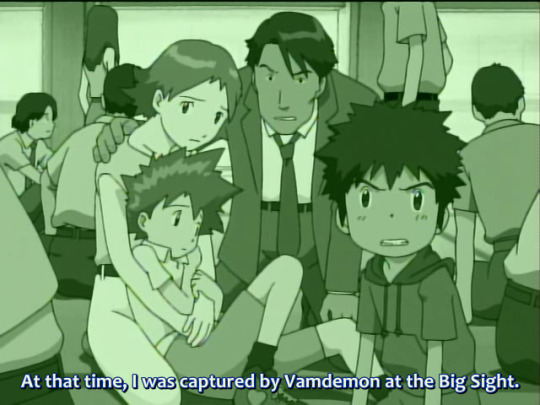
We learn in 02 episode 14 that Daisuke and his family actually lived in Odaiba back in 1999, with Daisuke as a (probably honorary) member of the soccer club under Taichi, Sora, and Koushirou. It’s hinted here in Daisuke’s face, but the Adventure novels and Spring 2003 confirm that he was extremely frustrated at his inability to protect his family (with Jun “gently comforting” him), to the point where “becoming strong enough to protect everyone” became his motivation thereafter.
So, really, when it all comes down to it and serious things are happening, this is a family that does have a lot of love for each other -- Daisuke outright admits in the Character Complete File that it gets lonely when even one person’s out.
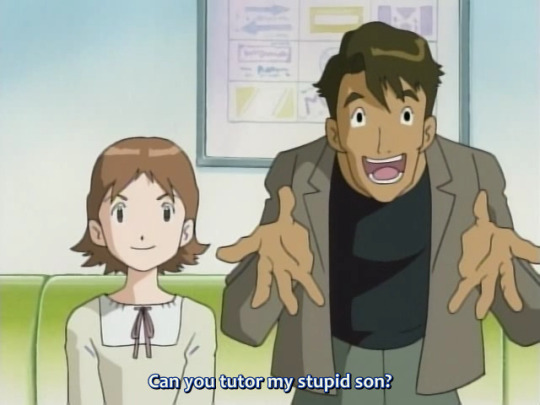

As it turns out, even the Motomiya parents have really dramatic personalities (the Animation Chronicle calls extra attention to Jun’s personality having been something she got from her mother), to the point where they suddenly get over-the-top excited when Ken comes over in 02 episode 35, and Daisuke’s irritated reaction makes it clear that this is expected behavior from them. (I promise you that Daisuke’s dad’s statement doesn’t come off as nearly as harsh or cruel in Japanese as it probably does in English here; it’s not any worse than him calling Daisuke a little silly.) In the end, Daisuke’s tendency to be over-the-top with all of his emotions and get ridiculously dramatic about everything is just something that came straight from his family.
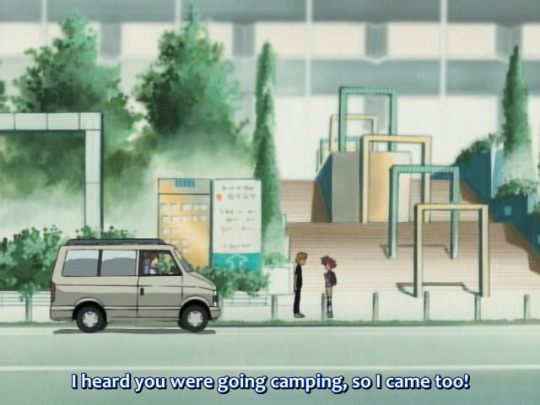
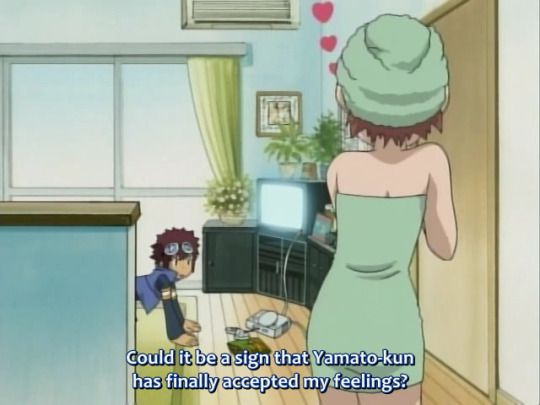

Actually, when you think about it, Jun isn’t really that different from Daisuke either, right down to losing a ton of brain cells when things start involving a crush -- she’s only slightly more in-your-face about it (and only via goading Yamato on a “date” in 02 episode 7, but this is “date”, singular, basically just convincing him to spend a day with her and take her somewhere, not actually being in the illusion that he returns her feelings or expecting a long-term relationship). She’s simple-minded, airheaded, fantasizes about the idea of Yamato returning her feelings without ever actually doing anything conclusive about it, and then, the moment she realizes that Yamato’s taken, mopes about it for one in-universe day before immediately switching her affections to Shuu like nothing had happened. So, really: it runs in the family.
(This also means that Daisuke’s probably not in for that much trouble if a day ever comes in which it turns out he’s conclusively rejected by Hikari for real -- his current relationship with her is based off him never making any firm statement and thus her being able to smoothly dodge everything, but if things ever truly get conclusively to the point where things won’t pan out for him, it’s not hard to believe he’d actually get over it quickly after an initial bout of disappointment.)
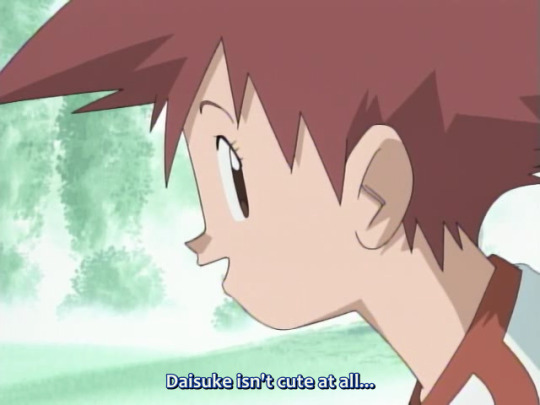
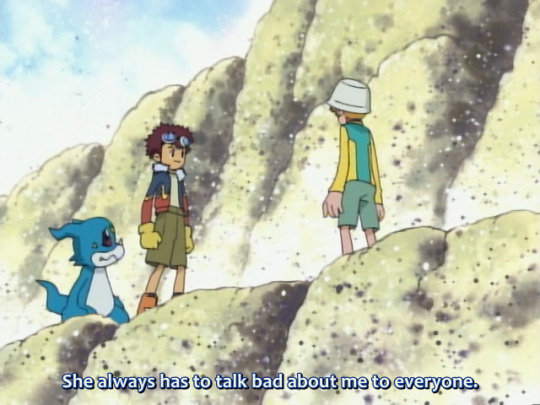
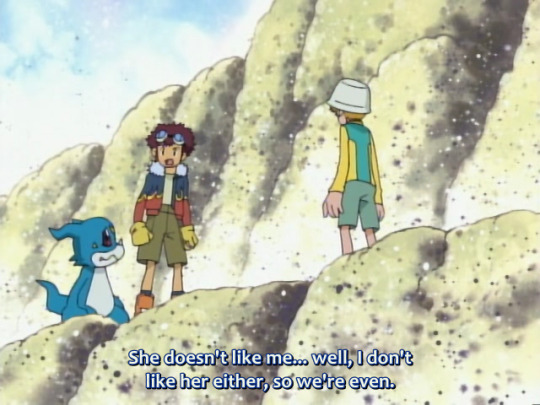
In 02 episode 4, Daisuke makes an accusation of Jun for constantly talking badly about him, and, if the Animation Chronicle is to be believed, he’s not actually wrong -- apparently “spreading bad rumors about him wherever she goes” is a habit she has. Given what we learn about her and the siblings’ relationship later in the series, though, it’s unlikely she’s doing this out of conscious malice -- by “rumors”, basically just trash talking her little brother the same way a lot of people reading this post probably love trash talking their siblings when they’re out of earshot, much like her calling Daisuke “not cute at all” earlier in this same episode. It’s a world that Takeru and Yamato (who had only seen Jun at her “best” earlier in the episode) are completely unfamiliar with, and Daisuke’s attitude of “hating” her causes Yamato and Hikari to get upset at him, but many a Digimon fan commenting on this episode has pointed out that a lot of sibling relationships are more like this than the ones between the Ishida-Takaishi and Yagami siblings -- a lot more ostensibly “vitriolic” and not as unequivocally admiring.
On top of the fact that Daisuke and Jun aren’t in need of overcompensating with their relationship due to a rift like Yamato and Takeru, or one party having unhealthy repression problems and requiring extra care, Daisuke and Jun are also a whole six years apart, which is even given extra attention in the Animation Chronicle. Which means they’re not very close in perspective; Jun’s all the way in high school, dealing with a baby brother who’s still in elementary, and so it’s rather understandable that they’re not really going to see eye-to-eye very much.

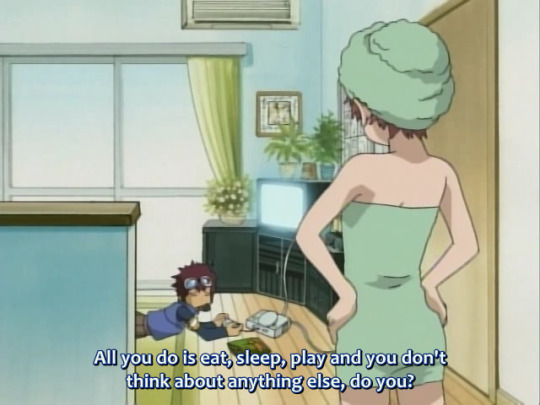
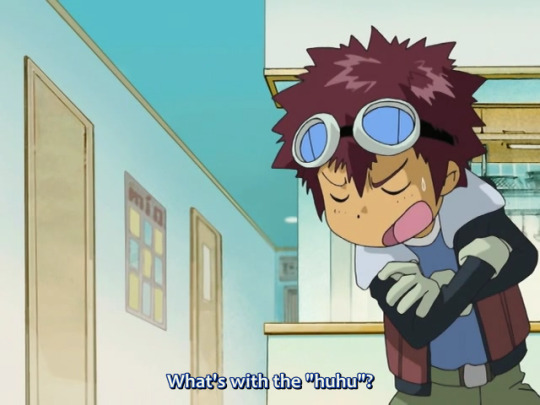
We get an example of a “fight” between them in 02 episode 35, but...
Jun: I really envy you, Daisuke...All you do is eat, sleep, play and you don't think about anything else, do you? Daisuke: I think about lots of stuff! Jun: Lots of stuff like what? Daisuke: Like...Lots of complicated stuff. But if I think too much, my brain freezes so I need to take a break sometimes. Jun: I'm sure it's nothing serious. Daisuke: Shut up! What about you?
It’s not really a serious fight at all -- just a lot of banter, the sort that a lot of real-life siblings would attest to also having been in a lot of. Perhaps, just the natural result of having a household where everyone seems to have the same slightly rough-around-the-edges, somewhat messy, overly dramatic, simple-minded and straightforward personality -- which also means they end up bouncing off each other and getting a little “crowded” (Daisuke very clearly not following Jun’s warnings to not use her soap bottles written all over them in red pen in 02 episode 15). But for all Daisuke had used the strong word of “hate” to refer to their relationship back in 02 episode 4, it really just seems like he’d been his usual dramatic self about it, and it’s all banter and occasionally being quick to criticize. Moreover, whenever Jun criticizes him, he’s actually less angry about snapping back at her or getting genuinely offended or sad the way he might with anyone else -- all he does is just fling a few quips back and move on, and doesn’t take it all that personally, so you could say he’s conversely rather comfortable with this status quo of getting to bicker with her.
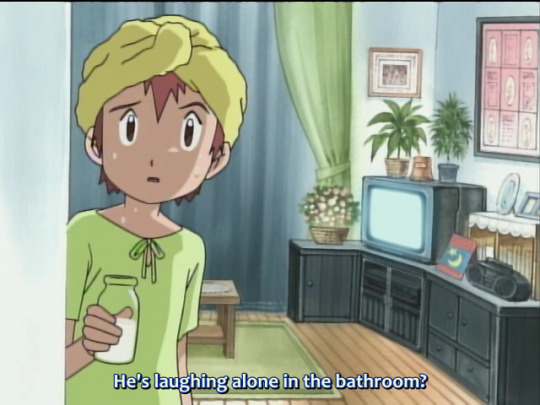
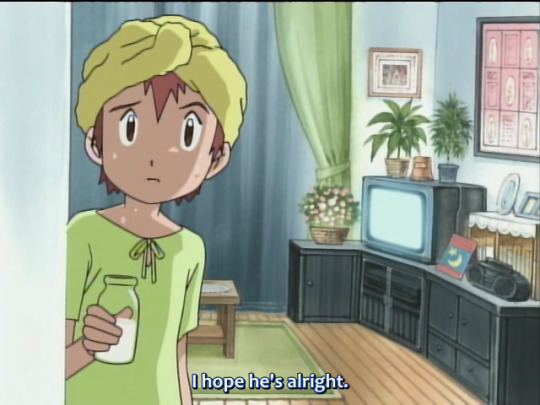
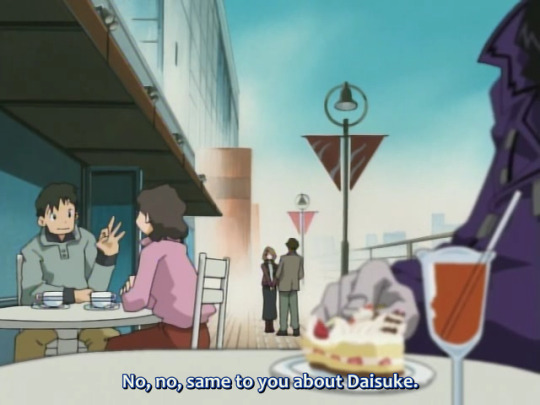
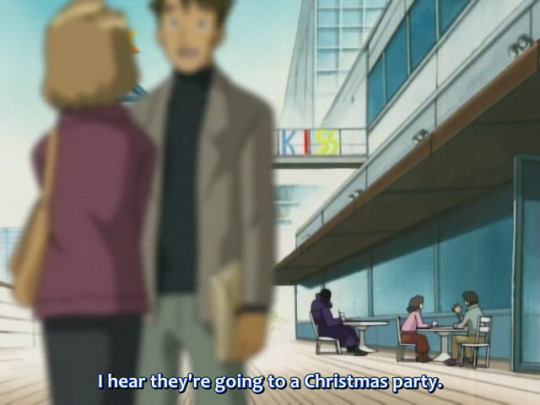
But, really, banter is just banter; even something as little as “Daisuke (seemingly) laughing to himself in the bathroom” is enough to make Jun worry that something’s wrong with him in 02 episode 15, and Daisuke’s father also personally thanks Natsuko for helping Daisuke out and waxes cheerfully about his son and friends having a fun Christmas party together. In fact, considering the context that Daisuke seemed to be pretty friendless prior to the series, the above scene carries the added implication that he’s probably pretty happy to see his son finally making some proper friends and going all the way to Tamachi to be part of a party.

And, eventually, as things get much more serious and the exact truth behind what Daisuke’s been up to is revealed to his family in 02 episode 50, they take this with the exact amount of grace and worry that a proper supportive family does.

Hence, why Daisuke can make a statement like this in 02 episode 49. Even if his family isn’t ostensibly full of hearts and affection, they’re supportive when it really comes down to it, and it’s not like Daisuke himself even really takes the surface bantering between himself and his sister all that seriously, so he doesn’t feel the need to ask for anything different -- and what he really wanted since that day three years ago was to be able to protect his family, and that’s exactly what he’s going to do now. Other than Hikari, the others had gotten “illusions” related to deep-seated issues involving their personal lives, but it’s not like he really would want it to be any different at home -- arguably it’d be outright weird to him if Jun suddenly got lovey-dovey with him or something -- and now he’s surrounded by supportive friends and his own partner. Sure, he has some tendencies towards being a bit on-edge and insecure every so often, but right now, in the midst of this very serious situation when something has to be done, and after a whole series’ worth of bonding with his new friends and gaining a sense of purpose, that’s more than enough for him.
126 notes
·
View notes
Note
dude ...I used to hope Taylor swift was bi / a fellow lesbian out of optimism lol, because i admire her work and when seen through the lens of a closeted woman all the secrecy metaphors make a lot of sense.... it would be so fascinating and heartbreaking if it were true! but I’m getting too old for conspiracies . I dunno. What keeps you believing?
okay so! i’m gonna preface this with a few things: it’s gonna be long bc i haven’t talked about taylor in a long time and i’m having Feelings and Thoughts, and my journey with miss swift is necessarily very personal and i won’t pretend otherwise!
firstly: i don’t think i need to “keep” being convinced. for me it’s not an ongoing search for evidence - i believe that her songs speak for themselves and all the personal clues that might or might not be reaches are just icing on the cake.
i grew up in a country music-listening household and loved tim mcgraw when it came out as a single when i was in middle school! i was pretty much hooked on her songwriting for then on, and her albums always seemed to come out at pivotal points of my life. “we are never ever getting back together” was the soundtrack to my move to university in 2012 and 1989 coincided with my junior year which was revelatory in that it was the time when i was really coming to terms with being gay. my journey with taylor dovetails super closely with my own personal journey, in ways that i think are familiar to a lot of people. as a young girl i latched onto her storytelling and her confessional voice and then as i began to realize i was experiencing attraction to women, i found a lot of comfort and understanding in her lyrics. this happened for me really late in life compared to some people! i was 21/22 when i first identified as bi, and it wasn’t until later i began to think it was possible i was a lesbian. my experience with unlearning compulsory heterosexuality, examining my own emotional interior life, and thinking about why it took me over 20 years to even consider i could possibly love women made me look at taylor in a new light.
i think everything i need is in her music. that’s where taylor is at her most uninhibited and truthful. i think when you look at the themes/relationships she’s been writing about since she was a teen, you can see that as long as you’re willing to suspend the presupposition that everyone is straight until proven otherwise, she writes in a way that resonates with gay women for a reason!! as a younger artist she relied on a lot of fairy tale imagery, perspective shifts, and idealized stories of love. especially when she talks about those songs.... (and she still does this), she’s always connecting them to movies, to books, to things outside of her own experience. and when she is clearly talking about herself, she takes second-person pov or otherwise spins narratives that are full of yearning and a hope for a perfect fairytale in the future. i think that mode of almost.... daydreaming about an idealized version of a love story hits close to home for us! and then her later albums are MUCH louder, with themes (as people have pointed out over and over again) that just don’t hold much weight if you view them through the lense of a very famous wealthy woman writing about equally well-to-do white men. when i hear songs about forbidden love, itching to hold the hand of your beloved in public, crying over seeing heroes die alone, spinning a portrait of a life in the future where she can share her home and her love with all her friends.... when she writes so acutely of pain and agony associated with living in a fishbowl and enduring long periods of being undercover and secretive with only stolen moments of peace/beauty.... EVERYTHING i need to believe she’s not straight is in her songwriting, which i view through the personal lense of being a gay woman myself.
everything else... the masterposts and the powerpoints and the “clues”... those are helpful in terms of opening your eyes to the concept of PR relationships and recognizing that just because you’re fed something by a celebrity doesn’t mean it’s real, but it’s not the base of my feelings about taylor. i will say though, i originally was convinced that taylor was a lesbian because of swiftgron, what we know about the two of them publicly without any reaching was enough for me to recontexualize lyrics i thought i knew the story behind, and to start thinking about her whole body of work differently. i will say also that i was never one to follow along with taylor’s personal life until this point, i had a passing awarness of the men she was supposed to have dated but i didn’t give it much thought. however, i saw swiftgron stuff right as i was recognizing i was gay myself, so it opened my eyes and almost... gave me permission to understand that het is not the default!! then of course i’ve been active since 1989 and watced kaylor unfold in real time. it is still my belief that during the glass closeting era, they were obvious because the kaylor rumors benefited both of them and laid the groundwork for a coming out that was derailed by kissgate. everything afterwards..... well...
i am not a fan of thinking of this as a “conspiracy” i think that that idea is perpetuated by homophobes that think that everyone is straight and assuming otherwise is somehow an insult or a gross invasion of privacy. i think the vast majority of people who think taylor is gay are doing what all swifties do, which is analyze her music with a layer of projection and personal identification. however i do think that taylor encouraged the speculation for a while, and fully intended to leverage existing kaylor fans into a solid base when she came out (which i do think was planned post-yntcd but was shelved). i think there is PLENTY to look at in her public image and personal posts/behavior that would lead to a person who is willing to look at things objectively to come to the conclusion that she wasn’t straight. she has absolute control over her image and there were too many public outings and “coincidences” to be an accident.
HOWEVER i think that people who run blogs or talk about her gayness based on obscure clues and overanalyzing every micro-movement are missing the point and often too dedicated to their own placement as “Big Blogs” or receivers of “intel”, in a way that is mostly embarassing and myopic. i have always always been of the general opinion that we will never know every detail of taylor’s relationships, nor are we entitled to that information. she is a breathing, thinking, complicated woman with a HUGE public life and an equally huge private life that belongs to her alone.
building a public platform based on smoke signals and secret messages and inside sources has never been something i’m at all interested in, and is largely unnecessary. her story is all right there in the lyrics of her songs, and the things she shares with us publicly. i do think there have been hints/clues in the past and they’re very fun to analyze (which she encouraged!!), but much of the digging/reaching is unnecessary! we will never know for sure until she comes out herself, but i believe that her whole body of work and her messaging speaks for itself. the only thing keeping people from more widely accepting this is truly the assumption that being heterosexual is a default, and you have to Prove otherwise with a preponderance of evidence. i readily admit all of this is influenced by my experiences and emotions as a gay woman, but everyone projects onto taylor swift.
i’m fully convinced based on her music + her past public relationships with women like dianna and karlie + her intentional hints that she is a lesbian. however i am not interested in inventing “evidence” because she’s not on trial! and i’m happy to wait for her to come out, which i absolutely think was planned for lover era and then abandoned for various reasons!!
185 notes
·
View notes
Text
You Have Been Lied To #4
hello again!
in the first few posts we have talked about
how the public narrative is carefully constructed by a global elite
how our entire perception of our past and how we came to be was shaped throughout history
how the myths and stories about a great flood and giants throughout all the cultures are real
how there are children going missing in massive amounts
and why they are going missing 1 & 2
while i am not at all hurt on a personal level by the fact that many people start to unfollow me - i really don't care for status, fame, pleasure, distraction, an online-reputation, or ANYTHING at all anymore -, i am really saddened that only a fragment of people care for the Truth. the only thing i can do is keep going and pray that people will wake up in time. many others have begun to wake up (a lot of people woke up because of the Qanon movement but i am not a Qanon).
in this post today, i'm going to shed light on what Nazi-Germany actually was. i personally didn't dig deep into my own research because i am entirely overloaded with all kinds of researches and Hitler is not really my favourite topic in the world. but i've read a great book that pulls from many well-researched sources, plus i am using my common sense. when you can count 2+2 together and it makes sense, you know that ist is the Truth. the 2+2 we are going to look at today is the following:
- we've learned that the mainstream media and the entertainment media serves mainly two agendas: 1. to keep the truth away from us, and 2. to shape our perception of WHAT is possible, what is fantasy, what is truth and what is just too crazy to be real. right?
so, according to this parameter, let me ask you the question: why do you think there are SO MANY movies and works about the Nazis being deep into occult knowledge and into mystical artifacts? Captain America: Civil War, Hellboy, Wolfenstein, the Indiana Jones series, Iron Sky, The Keep, and many others are part of this concealing of Truth. the reason why Hollywood wants us to believe that this thought is too fantastical and too absurd to be real is that the Nazis truly had religious interest in the occult.
here is a brief overview about the topic
there are quotes by Hitler himself which make one think what the heck did he mean by that...? (looking at it from a public narrative perspective ofc)
according to what i've learned Hitler was a huge follower of the teachings of Madam Helena Blavatsky - who founded Theosophy, basically the doctrine where the New Age movement gets pretty much all its ideas, and on which all the secret societies are founded: the Knights Templar, Golden Dawn, Freemasons, Rosicrucians, Ordo Templi Orientis, Illuminati and many more.
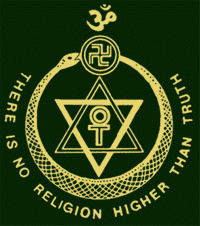
this image alone speaks volumes once you realize what’s being communicated.
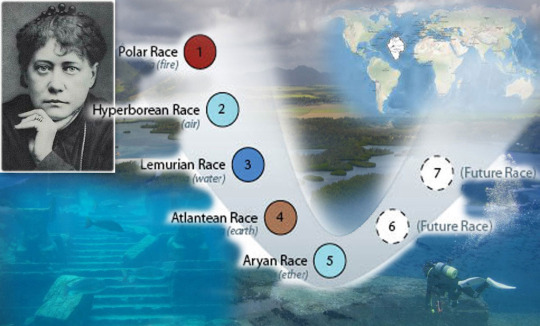
the Lemurians? the Atlanteans? THE ARYANS? after breaking the veil of deception that is around all of us, it couldn't be more obvious that Hitler was deep in the occult knowledge that was brought forth by Theosophy in 1875. it simply does not make sense at all that Hitlers only goal was to create a race that "has blonde hair and blue eyes" (though it plays a tiny role in this as well). Hitler truly believed with all his rotten heart that there is a race that is superior to regular humans. this religious belief burned in him and his Nazis like an insane fire and they went on a lot of expeditions around the world to find more occult knowledge and also a very specific thing which i am not mentioning yet.
there are a ton of actual real photos of Hitler and his Nazis in Tibet visiting the monks, and also Hitler in the Antarctica (which is a whole rabbit hole for itself but that one is really crazy *lol*) and whatever you've heard in the public why Hitler went to these places, it is not the Truth.
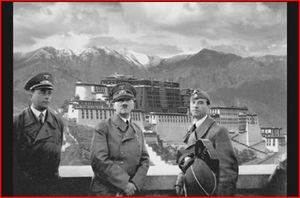
when i was still in this witchy community on here, i often saw posts that basically told Nazis to f*ck off and stop using Runes. back then i had no concept of why any Nazi would use the nordic runes except maybe the superficial thought of "Germans are germanics are nordics" or whatever *lol*, the Truth is, in Hitlers quest to unlock as much as occult knowledge as possible, he also visited Iceland and studied the Nordic Edda. [ Hitlers goddaughter was also named Edda, just throwing this in here ] - Guido von List (an Austrian living in Germany) was apparently the first one to assign mystical meanings to the nordic runes and founding an occult Religion named Wotanism, he died in 1919.
another thing i want to point out is the Swastika. you probably know that the Swastika is pretty much an ancient symbol and appears in ALL kinds of cultures of this world. there is a reason for this that goes deep beyond any regular comprehension, but the public narrative is that Hitler simply stole this symbol and made it a Nazi-Germany symbol, but the truth goes much, much, much deeper than that.
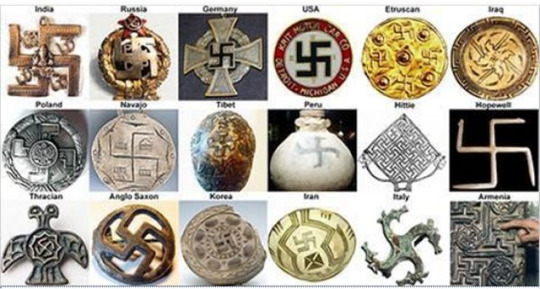
of course we can pretend like all of these connections are just "coincidences" and of course we can cling to the public narrative that is telling us lies, lies, lies. i dearly encourage everyone who wants to know the Truth about this world to start researching. in all of the previous posts i've mentioned and linked really good starting points. you don't have to be a Christian or believe in Jesus in order to find out about the world we live in (though, after discovering all of the pieces and puzzling them together, the most logical thought for me was to literally RUN towards Jesus and i know this is different for everybody but i am praying for you to find Him). i know a lot of this sounds crazy and flat-out foil-hat-kind of way. but always remember that this image of the Truth is on purpose. people who dig into the Truth get out-cast, people who discover the Truth and want to wake other people up are being labelled as wrong and crazy, get silenced, get threatened, get assassinated.
to say it in Hitlers very words: "Truth is not what is; Truth is what people believe it to be" .... sadly, that is very true in our society today. everyone just picks and chooses what they want to believe and there is no concept anymore of ultimate Truth because we are being lied to from each and every side. and i know this sounds radical and Noony how can you say something like this, and so on and so forth, i really GET IT. i understand that it sounds radical, i understand that it isn't what people WANT to hear. you can condemn me all that you want, i really do not care anymore, this is way too important than setting my own comfort above it. Truth is truth, and lies are lies.
one of my favourite scriptures in the Bible is "And ye shall know the truth, and the truth shall make you free." --- John 8:32 ... it could NOT be MORE accurate. it's actually mindblowing how relevant and true these thousand year old words are, especially today. i've never felt so light and free and happy and sane EVER before in my entire life. i've quit my psychopharmacy drugs a while ago (i've been taking prescription drugs for more than 10 years) and my life is looking just bright and wonderful right now, and this even though i almost died in April, still recovering from it. i am more courageous, more filled with love, more motivated, more friendly, more calm, my household is doing just fine, everything is clean and neat, i am doing my chores, my plants are thriving, and even though i am literally ALONE 24/7 (real life AND online) i never ever feel lonely. and i am living with wide open eyes and even though this world is HORRIBLE, i am peaceful now. the Truth really DOES make you free. i've stopped with all kinds of toxic things, from sugar to drugs, you name it. i don't crave neither stimulation nor attention anymore. it's incredible. i can only recommend it. what God and his prophets also foretold over 2000 years ago that it would be EXACTLY like this. "evil will be considered good, and good will be considered evil" - people who speak the truth and do the good deeds will be demonized by the masses.
doing witchcraft and magic and believing in the New Age NEVER felt evil because i was never harming anyone. and i am pretty sure that 99,5% of you people on here feel the exact same way. we are being conditioned by the entertainment media to believe that magic is wonderful, innocent and curious. Disney is doing a GREAT job easing little children into the concepts of magic and fantasy. and i know most of all people never harm anyone with their magic. and God didn't forbid us to do magic because he doesn't want us to have fun or to have a spiritual life, or because he thinks we don't deserve any of the things we can do for ourselves magically. God will HAPPILY provide each and every need of us. the reason why God forbid his people to practice magic, sorcery, divination and witchcraft is to protect us from being deceived. now, a lot of people will rebel mentally, and that's okay, i was the same way. before you haven't discovered the truth and combined all of the puzzle pieces, it really just doesn't make a lot of sense, is really provoking and sounds bad. i was really wrestling with all this myself. now, i am grateful to the Lord that this wrestling process ended up in me being OPEN to what He has to say, and discovering the Truth instead of rebelling and living a lie any further. Praise God for not giving up on me with my stubbornness.
today, i've listened to an interview with the Illuminati Defector that i've mentioned in an earlier post, who was going to be one of the highest ranks in the Illuminati (Queen Mother of Darkness). her name is Jessie Czebotar and she has made it her mission to bring light to this worldwide matter and help survivors being rescued. please listen to some of her interviews, it’s mind-blowing what she has to say.
honestly, when you realize how EVIL these people are and that they ARE witches and druids and that they USE the occult and witchcraft and magic on an EXTREMELY high and incredible level, the LAST thing you WANT is to continue doing the same thing. like. i am not judging anyone here, truly. because we simply do not know what's going on. but when you suddenly realize that EVIL PEOPLE like Hitler, like the Illuminati and the Freemasons and all of these secret occult societies did and ARE doing the same thing of which WE regular people think it's no big deal and it's okay, you simply wanna run, run, run from it as far as you possibly can. at least this is how i feel about it. i am not forcing anyone to believe me, i am simply encouraging you to at least find out why i am saying all these things to you, and then decide for yourself.
Jesus said that we will know them by their fruits. a good tree can only create good fruit and a bad tree can only create bad fruit. a good tree can not create bad fruit and a bad tree can not create good fruit. it's really quite simple.
God bless the ones that read this with an open mind.
46 notes
·
View notes
Text
an in-depth breakdown of b*ruto episode 178
sorry i’m late i was lost on the path of life
tl;dr yeah ok i can have my hopes and dreams about what specifically i would want but. BUT. honestly yeah the episode was more or less what i expected would actually be in it from the preview, so i can’t complain. i still sobbed!!! that’s all i really wanted!!
time to rewatch it! (warning: long post. LOL)
obviously this is nothing new but i still can’t get over how nice the exterior to the nara household is, good for them. i don’t think i noticed the solar panel before? good for them!
i’m entertained at how the episode does open with shikadai tying his hair as he walks, i just think it’s neat. i love how the camera frames it like seeing a nara with their hair down is something forbidden we’re not mean to see
temari has purple slippers i dedicate her commitment to her favorite color. (also i am Just Saying... purple........ the bisexual flag--)
yeahhhh ok so. i get the need for wanting to frame the narrative like this, but this really doesn’t make any sense. shikadai is 12, and is also a chuunin, like... he should know by now that his dad is always kinda a mess on this day of the year, and why that is. and even if he honestly really did just forget, the fact that he’s still asking his dad why he’s not at work while looking at the way his parents are dressed... did this not clue you in or what????
the fact that shikamaru’s up and ready (i really don’t think he gets much sleep on this day, every year...), and it’s shikadai who’s just getting up. i do think it’s cute that we do get to see a tiiiiiny bit of temari’s parenting that doesn’t involve being an out of character irrationally angry woman when she tells shikadai to not come crying to her when he’s late in getting ready, yeah that definitely sounds way more like her lol
temari says she told him about all of this the other day (shikadai blatantly forgot, he tries to pretend he didn’t but she doesn’t press him for it)... that does make me emotional thinking like. she is pretty painfully aware of how hard this is on shikamaru, and days in advance told shikadai about it, to try to make sure he understands what his father is going through........ she really does care about him so, so much.
i said this based off the preview, but... i would like to interpret that temari is purposefully doing the dishes(/rest of house chores) to give him space to grieve.......
the fact that while explaining what today is, shikamaru has to get up, leave the room, and talk while not facing his family, as if he wouldn’t be able to say the words as easily while looking at them........ god. that. that hurts.
\
tsunade being the one to give this speech kinda feels random? like yeah she was the one that was kage during the war but...? i do feel like it would have been more fitting to have naruto say the speech since the whole entire point of the war was to protect him (and bee) but ????? ok
no one in the uzumaki family talks during this episode which is fine by me LOL. i would assume the memorial is on the day the war ended (which would also make it naruto’s birthday/memorial of the kyuubi invasion) but if it is, it’s never stated. maybe it’s the day the war started, idk
the collection of people up front feels pretty random??? kakashi as the previous hokage, sure, guy i guess because of how important his contribution the war against madara was and also because he is kakashi’s husband, shizune kinda has to be there if tusnade is, but... iruka? like yeah he is vital to the narrative, but to konoha? he is the headmaster of the academy i think now so i guess...? but then? ibiki??? anko??? i say this as someone that REALLY loves anko, she was my favorite character as a kid and i still love her but,,, huh? SHE WAS KNOCKED OUT DURNG THE WHOLE WAR!!??!?
then you see everyone that was in naruto’s class + team guy + sai except hinata is in the crowd. which of course to the narrative, to us the readers, those are the main characters (if you ignore how more or less everyone was super shafted throughout all of part 2) but!!! team guy’s only real connection to the rest of them is that they took the chuunin exams together, and neji and hinata were are cousins. that’s about it. was it that specifically all of these characters made such a contribution to the war compared to every other single shinobi from konoha that lived ??????
shikamaru staring up to the sky did made my heart clench... no matter how different he is now than he was when he was a 12 year old genin...... i do feel like he’s never entirely ditched his true self of just wanting to stare at the clouds all day.... i’m not entirely sure what the intent was here, but i’m sure there’s supposed to be some symbolism here. the sky is actually nearly entirely clear (the way is framed, there’s only a tiny cloud in the corner,) and then he closes his eyes and hums. maybe it’s supposed to be about the closure he gets in this episode...
\
ok and then here’s ao cool whatever. since i only skim through b*ruto for the characters that i care about i do not really careeeee since i won’t watch again until something interesting happens to said characters that i care about LOL
?? who voiced the receptionist they sound familiar but i can’t place it at all
katasuke is the bitch that made the scientific ninja tool for b*ruto so he could cheat in the exam right
what is ao doing here. is he supposed to be doing something evil. it sure looks that way
... who is the glasses orange scarf guy??? he kinda looks like a mix between udon and ebisu and aoba but i know he’s not any one of them lol
\
TEMARI AND KARUI STANDING NEXT TO EACH OTHER... i don’t think in any media they’ve ever??? ACTUALLY TALKED TO EACH OTHER???? BUT THEY SHOULD BE CLOSE FOR THE OBVIOUS REASON....... I’LL TAKE THESE CRUMBS THOUGH THANK YOU
OKKKKK admittedly like. in terms of Pleasing Me, Personally, it’s a damned if you do, dammed if you don’t situation like.... they do kinda HAVE to acknowledge that neji died during the war so. i appreciate that hinata like........ cares. i guess. i’ll try to not post the whole rant about why neji’s death was (logistically how he died aside) narratively and thematically absolute bullshit, kishi (i believe) saying that neji died so he could play cupid for naruto and hinata like!!! fuck off with that shit!!! maybe if it wasn’t for the goddamn “naruto-kun’s big warm manly hand” line i would feel a little bit actual sad but no.
WHERE THE FUCK ARE YOSHINO AND CHOUZA HELLO!?!?!?!? COULD YOU REALLY NOT HAVE PUT THEM IN THE CROWD??
ino also has an unnamed mother that the anime made up that i believe was only in like a single episode (and was cameoed in RtN i think?) but she should still be like. Alive. so her too.
MITSUKI PLACING FLOWERS IS SO FUNNY TO ME LIKE YOU DO KNOW YOUR PARENT’S SUBORDINATE/DOUBLE CROSS TRAITOR WHATEVER DID CAUSE THE WAR RIGHT BFIOBU*EHW$
\
aaand. here’s shikamaru and ino’s conversation. i’m not sure if i can put this into words, but... just... the way that they talk to each other, the weight of 15+ years of sadness about this, the way that they just!! fully know what the other is going through, the way that they’ve known each other for their whole lives and survived through everything together, the way i feel like they’ve avoided talking about this topic as much as possible over the years, hell even during this conversation the way they’re almost bickering to avoid having to directly confront their feelings, but it is unavoidable.......
i also do wonder what their relationship with each other’s parents were while growing up: shikamaru does refer to inoichi as “inoichi-san” here, contrast to how their kids all call each other’s parents just “uncle” or “aunt”
siri play sad naruto flute.
ok since i did go back to rewatch the episode from shippuden right before watching this one for the first time i do wish a liiiittle less of the episode was about this flashback with the same reused footage like i get that they do have to put it in here but Still.
THE FACT THAT SHIKAMARU IS SMILING WHILE RECALLING WHAT HAPPENED, AND THAT THERE’S A LAUGH IN HIS VOICE........ I WANT TO CRY AGAIN
ino saying that it was so unfair how cool they looked in the end, and then giggles...... ino............. this must be so, so painful for her to recall, and yet.........
IT IS SO FUNNY HOW THEY SKIP OVER THE IMAGE OF SASUKE THERE AHAHAHAHA god i hated that so so much i can’t believe that’s manga canon. the line is perfectly fine and makes me cry just DO NOT RELATE IT TO SASUKE!!!! literally the only time they “”interact”” is when ino is introduced and ino just, for lack of a better word, glomps him???? THAT’S IT??? i feel like they might’ve changed it just because, well, you know the endgame pairings. but still. bye sasuke
damn you know what i do kinda wish they didn’t skip over the “get rid of that box before your mother finds it” part i AM curious as to what it was i mean it’s implied it’s something adult related so SP probably couldn’t show that on TV BUT!!!
ok ok all week i tried to not imagine what shikamaru and ino’s conversation would be since i wanted to go all “surprise me!!” BUT??? BUT. SHIKAMARU ASKING INO IF SHE THINKS THAT THEIR FATHERS HONESTLY, TRULY BELIEVED IN THEM?? HE’S BEEN THINKING ABOUT THAT ON EVERY SINGLE DAY THIS YEAR THESE PAST 15+ YEARS, AND SURELY IT’S ALWAYS BEEN AT THE BACK OF HIS MIND ALL THIS TIME!?!?! of course. OF COURSE HE WOULD FEEL THIS WAY!!! HE’D HAVE NO WAY OF KNOWING FOR SURE OR EVER FINDING OUT!!! like of course we as the readers know that shikaku and inoichi absolutely 200% felt that way but... from his perspective... you know what i don’t even think this idea ever crossed my mind HOLD ON THAT IS THE SOUND OF MY HEART SHATTERING--
and then he just... smiles. says that he won’t let that get him down, since it’s not like they’ll ever find out anyways. sure, it’s been 15+ years, he has had to have largely come to terms with everything by now, but...... still....
then he talks about the idea that the day will come and leave everything in the hands of their sons (now looking over at team 10′s turn to place flowers) just like their dads did... it is worded like a question, but showtaro morikubo’s absolute masterful performance does. it does portray a tone like he is absolutely 100% sure that it’ll happen, one day...
i’ve said this before but. i KNOW shikamaru has definitely spent so much time thinking about this. sure it hasn’t ever really been brought up on-screen (yet), but....... i want to see him talking about a direct contrast on what his grand plan through life he thought of by age 12, ending with him passing away by old age. obviously he did a complete 180 on they type of person he wanted as a wife LOL. it is kinda brought up at the start of shikamaru hiden while he visits the grave, says he hasn’t found anyone he’d give his life to protect... (well. now he has a son where if you see the recent chapters he is very, VERY protective of.) but i would like to see this change in his character be directly be brought up and examined
........ that being SAID. i sure hope neither of them actually like. die. i’m GOOD, thank you. they sure as hell can’t until they’re ready to pass things down to their sons, at least. until then, absolutely zero narrative reason to do so, but...... still. we don’t need to make everything an EXACT copy of what happened in naruto you can let them live kthx
they both say “what kind of half-baked response is that!” and then laugh just. I LOVE THEM SO SO MUCH TEAM 10 IS FOREVER
/
there is some symbolism in how ao walks over from a really dark shadowy area into the light when he decides that he has to pay his respects...
i do like how he does reflect on how he really should have come here earlier, but better late than never i suppose
i was expecting a... more elaborate explanation for how he lived??? especially since he was standing RIGHT NEXT to shikaku and inoichi... he just. happened to survive for whatever reason while every single other person died on impact
that survivor’s guilt does hurt to see
i do like seeing how he chooses to do something with his life, aside from being a shinobi, and live it to the fullest for the sake of everyone that died in the explosion. that’s nice
/
ino saying “i’m sure are fathers are happy!” AAAAAAAAAAA
IN HINDSIGHT....... I ABSOLUTELY SOULD’VE PREDICTED SOMEONE WOULD DROP A “YOU LOOK SO MUCH LIKE YOUR FATHER” AT SOME POINT IN THE EPISODE...... and. i did kinda chuckle, because like, no shit duh lmao. i’m sure shikamaru heard that all the time as a kid!!! and hell, i’m sure he still gets it from time to time over the years up to this day. BUT LIKE... SHIKAMARU’S FACE. HE LOOKS LIKE THAT, RIGHT NOW, IT’S ACTUALLY SOMETHING HE REALLY, REALLY NEEDED TO HEAR. LET ME CRY
hearing shikamaru say oyaji, and then the way his tone suddenly shifts to something very... quiet and somber? when he says “nara shikaku”..... something about that. man.... also it’s hard to see but there is a sweat drop on his face as he says all of this...
“sometimes, i end up wondering...” don’t lie to yourself. you think about this so, so much........
the flashback where ao says “listen to me calmly” when he says the bomb is coming this way sure reminds me of ino telling shikamaru to stay calm as she tells him that his son has a bomb around his neck
THE ADDED PART OF THE FLASHBACK WITH THEIR VERY LAST MOMENTS...... THE WAY THEY’RE SMILING AND JUST??? BELIEVE IN THEIR KIDS IN THE VERY END. just like how it’s described in shikamaru hiden where the narrative says that shikaku was a shinobi until his very last breaths-- actually, no. in the very end he was a father.......
“THEY BELIEVED IN YOU, WITHOUT A HINT OF DOUBT.”
AAA?A?AAAAAAAAA?A?A?A??A!??!!??!!
INO STARTS TEARING UP BUT I CALL ABSOLUTE BS THAT SHIKAMARU WOULDN’T ALSO JUST BURST ONTO TEARS ON THE SPOT, HE MAY BE 32 WHATEVER YEARS OLD NOW BUT... HE IS STILL SUCH A CRYBABY AT HEART, HIS ENTIRE CIRCLE OF LOVED ONES KNOW THIS.
you know who DID start crying though??? ME
/
i do wonder, is this the same hillside that shikamaru went to after asuma’s death...? (only in the manga tho, the anime had him on a rooftop instead)
is that??? someone watching them in the back left?? when shikadai finds him? i cannot tell what that is
i am. trying to follow temari’s logic of telling shikadai to go find shikamaru and... not also going with him?? i mean i figured from the preview that, yeah it does look like it’s only the two of them, but... i can’t come up with a reason. not a super big deal but. obviously my heart yearns for that shikatema content that’s ok i can write my own fanfic i guess!!!!
also like...... i imagine it can’t be THAT hard to find him, i’m sure that he only has a small handful of Spots Good For Coping(™) when he just needs to be by himself, that i would Think his wife would know where they are. and said wife would tell shikadai. but idk
after all of this, shikamaru wants to just treat his son to go eat out whatever he wants...!! what a good father
....... now like. the logic of “temari is currently making dinner and that’s why she’s a) not there and b) told shikadai to go fetch is father” would make perfect sense. but... if they’re going out to get food then... no?? shikadai would interject to say so if that was the case..... that makes this all make no sense seriously what the hell is she doing
i do wish that like. shikadai like.... uh. actually learned about more shikaku?? this scene is more brief than i thought it would be idk i felt like it would be part of the middle of the episode and not at the end, oh well. he’ll find out in due time
THAT BEING SAID... STILL. THE ENDING WHERE HE JUST CARES SO SO SO SO MUCH ABOUT SHIKADAI!!!! WONDERING IF HE’S WATCHING HIS BACK!!! I LOVE THEM I LOVE THEMMMMM
/
not quite sure whatever ao is doing at the end of the episode???? IS IT EVIL??? i mean like that it’s him catching a leaf seems like he’s going against konoha but i mean konoha fucking sucks so. that is not evil i guess LOL
whatever not like i’ll care to actually find out!!!!! anyways let me know when the nara family (or anyone adjacent to them) does anything so i can care LOL
in conclusion. good shit.
7 notes
·
View notes
Text
Zenin Maki: Family or Strength
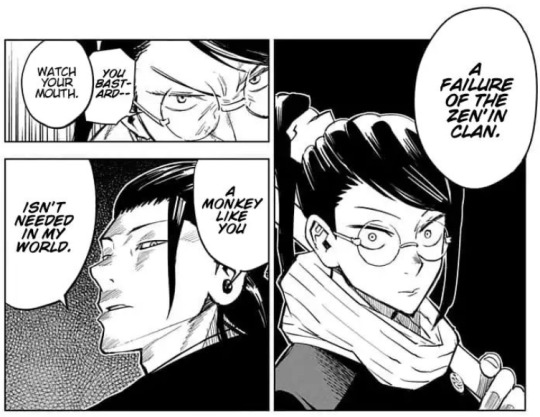
Zenin Maki is one of the most complex characters in the story of Jujutsu Kaisen, she’s also one whose motivations we know a great deal about already due to her being featured in the prequel, and her continued development in the main series. In her character she represents one of the main themes of the series, the conflict between defining yourself individually (by who you are and what standards you set) or by defining yourself by the people around you (conforming or going with the expectations of other people). Maki’s struggles to be an indivudual in a world that has already written her off as a failure is pretty central to the themes of the story. MORE UNDER THE CUT.
Maki is caught in a pretty classic Want/Need conflict. All stories are rooted in a character’s conflict. Maki’s conflict is with herself as much as it is with the Zenin clan.
A want is at its simplest, the Thing Your Characters Wants is the plot goal. [...] Whereas the Want is a direct equivalent of the plot goal, the Thing the Character Needs is a direct correlative of the thematic value. Whatever Truth your story is positing about reality, that is the ultimate Thing the Character Needs. [x].
A want is oftentimes something the character defines for themself. It’s what motivates them to move forward. Whereas, the need is what the story itself says they need in order to grow.
You don’t make a character change by giving them exactly what they want, which is why the want and need are often in conflict with one another. In most cases a character grows over the course of the story to realize their need in the end. The want motivates them, the need is their resolution.
What Maki wants is to be recognized as an individual. She wants to prove her family wrong. Her family has already defined her as a failure. Just like how Getou sees her, because she has no natural talent for jujutsu sorcery her own family has denied that she’s even a person. She’s constantly dehumanized by them. If she’s not useful for Jujutsu Sorcery, then she’s nothing at all. For Maki, being her own person, and living for herself, her own amibtions, is an act of rebellion against her family who want to deny her everything.
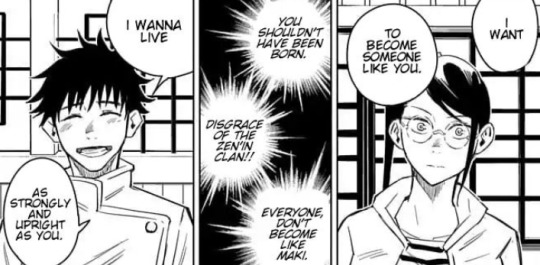
Maki’s want is an almost childish sense of revenge. An “I Told You So”. She wants to prove the people that dismissed her wrong, by proving she’s better than them. She wants to make the Zenin clan bow their heads to her.
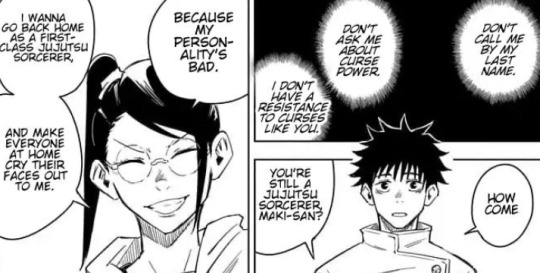
Wants are not bad things. They are what motivates the character to move forward. Maki’s spiteful amibtion, the fact that what she wants is basically no better than revenge, is neither a good nor bad thing in the context of the story. It’s her driving force. Maki is allwoed to be spiteful and angry at the way herfamily treated her. Yuta, who is basically one of the most soft-hearted and understanding characters in the prequel completely approves of her ambitions.

The fact that she’s selfishly motivated. The fact that she wants to do all these things for herself. Her strong sense of individuality are not bad things. They are just the things that make Maki, Maki. In fact rebelling is basically the only way Maki can be an individual. Her urge to destroy her family is not presented to us as a bad thing, but rather something necessary for Maki to truly grow and be herself.
However, once again a want is not the entire answer. You don’t make characters change by giving them what they want.
Moron, this only works if I’m doing it by myself.

Maki wanting to be stronger than anyone in her family. Her focus on individual strength above all else. None of these are bad, however it’s not entirely what she needs either. Look at what she says don’t go feeling like you got accepted.
It’s almost like some part of Maki is afraid of those feelings of acceptance. She feels like family is something she has to throw away in order to be strong.
I do not mean in a sense that Maki will not work with people on her team. She clearly has the ability to form connections with people as friends, get along with others, and even cooperate owith them as a team and care for her comrades. However, she never lets her feelings go any deeper than that. She’s gone so long without unconditional love and acceptance that she feels like she has to destroy her own need for such a thing.
1. Maki vs Mai
Maki has two significant foils in the series who share this same conflict, choosing between your individual development and strength, and also your need to be accepted by the people around you.

Mai is presented to us first as someone who looks down on Maki like the rest of her family. This makes sense because at the time the story was telling it from Maki’s perspective mainly. Maki tends to see her whole family, even her own twin sister, as the other.

However, we’re presented with two different narratives. That of Maki who left the family and began to develop as her own person. That of Mai who stayed behind with the family, and had to continue living inside of an abusive household. The narrative becomes one of not Maki or Mai being the better sibling, but rather two siblings reacting to an abusive household in different ways.

Mai has never once thought her sister was weak. She’s just parroting what the rest of the clan says about Maki in order to get Maki’s attention after Maki left her. Mai has always thought Maki was the stronger one between the two of them, but the thing is Mai doesn’t care about strength at all.

What Mai wanted was a personal connection with her sister. That’s why she mentions not telling her who her first crush is. In order to become her own person Maki has distanced herself from everyone, but that also means as a consequence Maki has shut Mai out.



It’s clear Mai reads Maki’s declaration and decision to leave the family, to leave her behind in an absuive household to also mean that she’s rejecting her sister, the one family member who loves her for her.
Once again neither sister is wrong. Maki wanting to run away from an abusive household when she’s a teenager and can’t really take care of her sister, or maybe even did not have the ability to bring her sister with her is not something that should bee expected fo a cihld. Mai turning against Maki for bieng left behind in an abusive environment, and not knowing a healthy way to reach out to her sister is also what’s to be expected fo a child. It’s not Mai and Maki who started this conflict, it’s the adults that pitted them against each other.
Mai is not trying to put Maki down because she sees herself as superior or anything like that, she literally has always thought Maki was much better than her. It’s a pretty basic cry for attention.

Both sisters want and chose different things. Maki wanted to be herself, Mai wanted a family. Neiter of their desires are wrong or better than the other. Mai is not wrong for wanting a normal life, Maki is not wrong for wanting to be a Jujutsu Sorcerer.

However, because Maki has to draw such a clear line between herself and other people. She can’t accept or understand Mai’s feelings. The conflict between the two of them goes completely unresolved. Because, Maki doesn’t have to leave those connections of unconditional love and acceptance behind to be an individual, she just thinks she does. That is the point where her want clashes with her need.
2. Maki vs Toji
Maki and Fushigoro Toji were both born into the Zenin clan, and both suffer from the same inability to see cursed spirits. While at first the comparison may look like a positive one for Maki, Maki is choosing to stay inside the system and work to prove herself better than what her family told her she was then going completely rogue and living as a mercenary for money like Toji did.
However, eseentially both of them made the same choice. They chose power, and their own personal ambitions over their family. The first thing we learn about Toji in story is that he left his son behind, and practically forgot about him.


While Maki is not responsible for her twin sister the same way that Toji is responsible for his son, they still both believe they have to throw away those kind of family connections in order to survive as an individual. They don’t allow themselves to feel that connection.
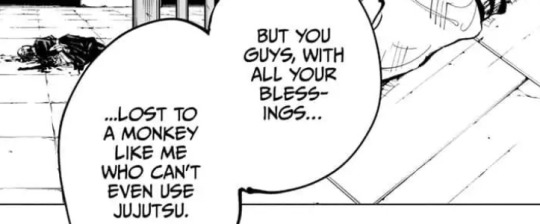
Toji seems to live entirely for himself, and to prove others wrong about him. He has the same want as as Maki, to be stronger that the Jujutsu Sorcerers who dismissed him. They just chose different paths, Maki works from inside, whereas Megumi this late in his life has gone completely outside of the system.
Toji s a lot more spiteful than Maki towards talented people. Maki’s more self directed and doesn’t blame everybody around her for her circumstances, so much. She’s a lot more focused on herself and her own sense of self improvement. However, both of them have an extreme amount of self awareness and use that to push themselves to develop their bodies to their absolute limit.

Toji is someone who is incredibly aware of his own limits, and rather than that making him unmotivated it causes him to be an extremely strategic thinker, and also push his body beyond even what most Jujutsu sorcerers are capable of. He makes excuses for his own violent behavior because he’s nothing but a reject and a monkey, but he doesn’t let other people’s talents be an excuse for him to be weak. When he sees Gojou fighting him at full power, he doesn’t hesitate or run away, he literally approaches the situation with an extreme amount of determination that believing he can overcome it.
As a person he’s practically a disaster, always eating fast food, gambling, leaving his son behind, and acting immature and irresponsible with his business partner. Whereas Maki is much more cold and composed. However, this behavior stems from the fact that Toji, like Maki, has focused his entire life around fighting and therefore everywhere else he’s underdeveloped as a person. He’s the extreme result of Maki’s belief that if she’s stronger than her family, that will somehow fix what is missing inside of her.

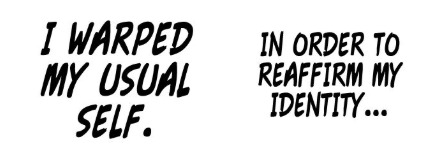
Toji even says he believed the only way to go against his family and continue being himself, was to twist his personality like this. That he had no choice but to become this way in order to deny what his family said about him.
However, what Toji regrets as he’s dying is not that he wasn’t strong enough. He doesn’t even regret becoming a crimminal, or rebelling against the Jujutsu world. What he regrets is that he threw away his family in the process.


What he wanted was to be strong. What he needed was a family. Maki and Toji are not exactly the same, but Toji is a cautionary tale that shows us that Maki’s choice to reject understanding and acceptance is unhealthy behavior. It’s what she wants and not what she needs. And these things are not mutually exclusive, Maki can both pursue her own individual strength and at the same time accept others around her. The manga has always advocated finding a balance, and a reconciliation between the two, rather than one as being more important than the other. Just like her conflict with her sister, beating her sister in a fight proves nothing. What Maki needs is reconciliation, the ability to understand her sister’s feelings and also have her sister be able to understand her own.
She needs those connections to be an individual. We are defined by ourselves, we are defined by the people around us. It’s not either or, it’s both at the same time. Maki’s choice isn’t even a choice she necessarily needs to make, she’s allowed to choose both.
#jjk meta#zenin maki#maki zenin#toji fushigoro#fushigoro toji#zenin mai#jujutsu kaisen#jujutsu kaisen theory#jujutsu kaisen meta#meta
207 notes
·
View notes
Photo

Marona’s Fantastic Tale (2019, France)
Before delving into the thick of this review, I have a few personal biases to reveal. First, I am not a “dog person”, let alone a “pet person”. I understand why people adore dogs, but I have long been uncomfortable around them – small, energetic ones especially. In addition, I tend to view the subgenre of animal movies (dogs, cats, horses, etc.) as littered with saccharine, but nevertheless watchable, dreck. Reading back those last few sentences, you may conclude that I am describing a heartless monster that should not be trusted with living things. So be it.
Anca Damian’s Marona’s Fantastic Tale, also known by its original French title L'extraordinaire Voyage de Marona, avoids the common traps of this subgenre. It, too, happens to be an animated film. Damian, a Romanian-French filmmaker, has previously only directed two animated features, both documentaries: Crulic – The Path to Beyond (2011, Romania/Poland) and The Magic Mountain (2015, Romania/Poland/France). She is, foremost, a dramatist concerned with humanist ideas and values. Damian and screenwriter Anghel Damian (her son) treat the title character – also called three other names – as maturely as any human character in this film, where other filmmakers in this subgenre might only do so superficially, to elicit obligatory “awws”. Marona’s Fantastic Tale artfully depicts the perspective of its canine star through the chapters of her life. These life chapters are laden with ambiguous resolutions and important conversations and decisions withheld from the viewer – moments where love, responsibility, and survival intertwine or clash.
The film begins with the female dog’s death. She (voiced by Lizzie Brocheré) has been hit by a car, and narrates the rest of the film, framed as a recollection of her most potent memories. Her first given name is “Nine”, as she is the last of nine puppies between a mixed-breed dog and a purebred Dogo Argentino. Nine is shortly adopted and immediately abandoned. As a stray, she is adopted by a struggling acrobat named Manole, and given the name “Ana”. Happy though their initial time together may be, Ana recognizes she is an impediment to his financial situation, and runs away. Slumbering at a construction site, she is grateful for the warmth of architect Istvan, who always brings her food. Istvan, who calls her “Sara”, eventually brings her home to his manipulative wife who abhors Sara. Lastly, our protagonist will be adopted by a little girl named Solange, who names her “Marona” (from the French word marron, meaning brown; I will refer to the protagonist by her final name for the remainder of this review). Solange’s overworked single mother and irascible grandfather oppose the impromptu adoption for differing reasons, but eventually accept the new addition to their household.
I may not know much French, but Lizzie Brocheré (The Magic Mountain, 2017′s Rings) is a wonderful narrator. At least half of the film’s lines come from Marona narrating her unfolding life. In her voice, Brocheré captures numerous emotions: joy, regret, indignity, confusion, yearning. Marona, whose understanding of the world is similar to that of a young child, is devoid of enmity – even when faced with humans showing little concern or dismissive of her well-being. The film keeps Marona’s narration to a certain register, leaving the greatest narrative subjectivity to the film’s visuals and not Marona herself. Marona’s narration reveals how she interprets the world around her:
[Dogs] want things to stay exactly as they are... Humans always want what they don't have. They call it dreaming. I call it not knowing how to be happy.
Marona’s Fantastic Tale employs various animation styles in ways that may not feel sensible at first. Humans do not look like humans. They come in all colors of skin (blue, green, incomplete black crayon upon white construction paper etc.) and impossible figures (Manole, the acrobat drawn in yellow and red stripes, has stretchable, tubular limbs that any real-life acrobat would envy; other characters appear anything but humanoid). The most conventionally “human”-drawn characters in Damian’s film are those closest to Marona during her life – namely Istvan, Solange, and Solange’s mother. Marona, and the viewer, find comfort in these familiarly-shaped humans. Istvan’s predominant blue skin is a cool color, contrasting against his wife’s vaguely ostrich-like yellow-and-black appearance – attributes shared by her gossiping and materialistic lady friends, all of whom may need to see the doctor for possible jaundice. Like any animation director, Damian uses the character animation in this film to code viewers’ perceptions on a character. But the abstraction of Marona’s Fantastic Tale means she and her animators can further exaggerate characters’ physical aspects and experiment with color. The film’s backgrounds are a mesmerizing interplay of hand-drawn and CGI animation. Depending on where the camera is approaching, the apparently 2D backgrounds might unfold into layers of CGI, and vice versa.
These effects are bewildering. They appear as one might imagine a small dog might understand humanity’s vastness of appearance and personality, as well as the sprawling natural and man-made world they occupy.
youtube
Even more abstract through Marona’s eyes are the concepts of memory and time. On occasion, Damian has Marona reminisce about her past – an abstract flashback within a larger flashback. That past is filled with heartache – of being separated from her litter, her multiple abandonments. But in the confusion of understanding human motivation, Marona’s unconditional love for her mother and siblings and those who have taken care of her shines through. Hers is a melancholic loyalty, abiding despite abandonment. Time’s passage in the film is linear but inconsistent, leaving the viewer to make inferences for themselves. As a being with a short life, Marona has little time to find the most fulfilling, profound moments of her life in things that a human might deem mundane (in an occasionally funny piece of narration, she says, “A good sense of smell is worth a thousand words.”)
Every human in Marona’s Fantastic Tale is beset with character flaws and, with the exception of Manole, difficult familial lives. Their flaws may manifest themselves towards Marona, other humans, or both. Marona observes human frustration, jealousy, and pettiness and can always sense the unspoken tension that precedes a fateful action. Here, the film plays out not only as a simple flashback, but as a sort of dying wish. Marona, who we know is dying or is en route to what happens after death, appeals to the viewers without so much directly addressing them. It is an appeal for understanding: to realize our personal faults and to exemplify the consideration and goodwill that makes living worthwhile.
Some Western viewers might be irked that Marona dies in the film and that her death does overhang the proceedings. (They may be too accustomed to the excessively manipulative and stereotypical death fake-out so common in dog movies. Picture, if you will: a dog is shown to be in peril, the human characters hang their hands down acknowledging the likelihood of a dog’s death, but there is sudden uplift when, against all odds, the dog protagonist comes over the hill or rounds the corner and leaps into the arms of his caretakers.) But Anca and Anghel Damian have taken care to ensure that Marona’s death is handled as non-sensationally and abstractly as the rest of the film. Morbid it is not. That is no easy feat for any filmmaker, whether working in a live-action or animated format.
Marona’s Fantastic Tale does assume some life experience and contains presumed moments of cruelty, so I would hesitate to show the film to very young children. But the film should play well to slightly older children and, of course, open-minded adults. Marona’s Fantastic Tale is a film concerned about how time claims all, how dogs and humans might leave behind an example of love that sustains even in our darkest moments. That it does so convincingly through Marona drives this film’s beauty.
My rating: 8.5/10
^ Based on my personal imdb rating. Half-points are always rounded down. My interpretation of that ratings system can be found in the “Ratings system” page on my blog (as of July 1, 2020, tumblr is not permitting certain posts with links to appear on tag pages, so I cannot provide the URL).
For more of my reviews tagged “My Movie Odyssey”, check out the tag of the same name on my blog.
#Marona's Fantastic Tale#L'extraordinaire Voyage de Marona#Anca Damian#Anghel Damian#Lizzie Brocheré#Pablo Pico#My Movie Odyssey
5 notes
·
View notes
Text
Rhapsode’s Top 10 Favorite Fire Emblem Antagonists
Hey guys, so I wanted to do something a bit special because of a few asks I’ve gotten from time to time. Namely, who are my favorite villains in FE. Thing is, I wanted to do something with this for a while outside of an ask, and hear I am.
Now before I even start, these are all MY OPINIONS. These are my favorite antagonists in FE, not some objective masterlist that means anyone who isn’t on here is a bad villain. If you agree with me on this list, great! If you think I got everything wrong, I respect that opinion.
So if I left out any of your personal favorite villains in FE, let me know in a reply or reblog.
Now a little bit of criteria on how I had made choices,
Uniqueness: What does a villain bring as a character. Because FE is nothing if not a bit archetypal.
Impact on the Narrative: Now I think a good villain should be an active participant in the narrative as well as have a level of relevance. They also should have relation to the lore of the world they’re in.
Personality: In my opinion even a poorly written character with a magnetic presence can be more tolerable than a poorly written character with no personality
Were they satisfying of a boss in game: While FE emphasizes narrative, it has some terrific gameplay. So I would hope the opposing units really give you a run for your money.
Oh and fair warning, this will have spoilers.
With all that out of the way, sit back and I’ll tell you all about my favorite FE villains!
10. Uhai (Fire Emblem: The Blazing Blade)

Yeah, so, we’re starting with probably the most tertiar antagonist on this list. While Uhai might not seem that important in the grand scheme of things. Being a Black Fang member who’s scared of what Nergal is going to do and is out for Ninian.
So why did I pick him over other Black Fangs or Saceans?
Well in terms of Saceans, I really felt Uhai brought the most personality compared to someone like Glass, who was pretty basic. Especially for Lyn’s final villain. Uhai definitely felt the most… “Sacean,” if that makes sense. Having a code of honor and integrity. As well as acting on self preservation.
And while Uhai isn’t my favorite Black Fang, he shows something different as being one of the original fangs and having this sense of honor. Which was a really nice reminder about the humble origins of the Black Fang.
I also really like how he could’ve easily killed Lyn when he kidnapped her, but let her go to kill her as a warrior. Given Lyn’s underlying theme of fighting sexism, to have an opponent that didn’t factor in her gender and would fight her on equal terms, it was a really cool scene.
Sadly, he’s just a minor antagonist and if he got more time like being a part of the Four Fangs, I think he could’ve really added more.
9. Orson (Fire Emblem: The Sacred Stones)

Orson seems pretty simple all things considered. He loved his wife, Monica, and after losing her, he is willing to make a deal with the devil to bring her back. It’s not much, but I think what plays into the effectiveness is seeing him before his wife is revived and having him on your team, then watching what he has become after her revival.
Having a villain who starts off as a playable character and then later is an antagonist is always tricky. From a story perspective, you spent time with them that even you, the player, feel negatively affected by the heel turn. However, from a gameplay aspect, it's a tad annoying if you spent time grinding them.
Orson, is pretty obvious in that he’ll be turning against you, but we really see him as a somewhat charming and endearing guy at first. But then when he returns to Renais to be with his wife, it leads to one of the most unsettling narrative shifts I think FE has done.
We see him now in charge of Renais, but now more mentally disturbed, physically malnourished, and locking himself away from the rest of the kingdom to be with his wife. Seeming like magic has possessed him. But when you find that this is due to being reunited with his wife who is now just a corpse that can only say “Darling” you really feel this messed up mood permeating the chapter.
There's so much unsaid, and I think that it works to the advantage of the story. Comparing the Orson you meet when he’s your ally to the Orson you meet as an opponent, it really doesn’t need to be said how he fell so hard. That Orson has given up so much and now that he has his wife back he’s just convincing himself that she’s alive.
While another villain on this list did the heel turn far better than Orson, I still think that the sheer shock of Orson’s story really makes you feel for him, while just wanting to end him.
8. Bloom, Hilda, Ishtar and Ishtore (Fire Emblem: Genealogy of the Holy War)

So this one is definitely cheating.
While only two members of the Friege family could really stand on their own as definable villains, I actually think when all are together they offer something more unique for FE. Families of villains are a bit of a rarity in FE, especially ones whose family dynamic is well defined in the main story, and not supports.
But with Bloom, Ishtar, and Ishtore, you get to fight all of them in a chapter thanks to the set up of the Genealogy of the Holy War. It allows for a more unique encounter and this growing feeling of outrage if you end up killing a member of the family.
House Friege continuing on as secondary antagonists in the second generation was a great addition. Giving this sense of history repeating itself, with Bloom seemingly no better than Reptor from the first generation, but where as he is a power hungry politician, Bloom shows some shades of gray in his detestment of Child Hunts and actually being a somewhat decent father figure to Tine. Which actually leads to some interesting contrast to his wife, Hilda.
Hilda is easily the most monstrous of the family, and while I was considering her to be her own separate entry, as she is possibly the most wicked and cruel female villains in the entire franchise. Driving Tailtiu to death, and using Ishtar as a step towards more power. Her additional role a matriarch of the household who married for Bloom’s money and power, adds an extra layer to the band of villains.
Ishtar and Ishtore also offer a role as both not being Child Hunt supporters but act in different ways to them. With Ishtore not getting involved and instead spending more time on Liza and Ishtar actually working with Arvis to free the children rounded up.
As a family unit, it offers a lot of unique villain interaction that I’m sad the limited technology of the time couldn’t capture all of. I’m glad that games like Fates have tried making family units as opponents, but I’d like to see a dynamic similarly fleshed out as the Frieges.
7. Jedah (Fire Emblem Gaiden/Fire Emblem Echoes: Shadows of Valentia)
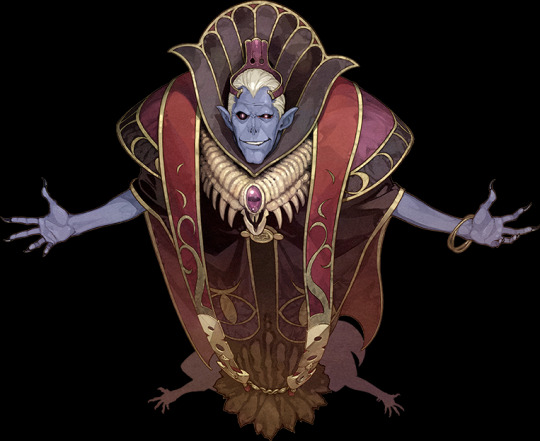
Okay, how the hell did this guy so high up on the list? No joke, Jedah started at the bottom when I first started this list. I mean, he’s just another Gharnef. What makes him all that different from Nergal or Manfroy?
Well, truth be told, what got Jedah so high up for me is presentation. A lot of Gharnefs are the big game manipulators, and sometimes that can be frustrating if you’re not really in the character. I think Manfroy is one of the most effective villains, but he’s not particularly stand out.
Nergal is a far more justifiable villain with his motivations, but he’s basically corrupted by “Darkness.”
Jadah, especially in FE15, oozes personality and charisma. I give a lot of points to his more inhuman design that went beyond just making his a wrinkly old man. As well as his expressions. When playing Three Houses, I was shocked at how stone-faced Thales was. But with Jedah, I feel like the artists took a lot of opportunity in giving him a face that could contort in such a way to to sell how much of a schemer and villain he was.
He has this look of a guy you love to hate.
Also, in terms of story, Jedah really does eclipse Rudolf as a villain (Yes I know, Rudolf is not really a villain) and is easily a more proactive villain than even Berkut. While Jedah serves Duma faithfully, the purple baddie still seems to have done more as an antagonist then the detriorting dragon.
He’s really the most satisfying overarching villain next to Berkut. And power, don’t get me started. While Gharnef’s Imhullu seemed relatively foreshadowed on how he wouldn’t be beaten by normal means, the first time I fought Jedah, I was surprised just how much of a gap in power there was between us. As well as the terrors he summons for the first time are more lovecraftian than the other terrors you fought before.
While Jedah is definitely a fun villain, his greatest weakness is that he is unquestionably in the morally black category. The man sacrificed his own daughters to prove his loyalty. Before then, there was a bit of an argument to be made that witches were just a sign of society and that offering up your soul for more power was just common in a power focused structure. But sacrificing your daughters is a tad on the unforgivable side.
As well as his end goal is really just war and conquest, while being Duma’s number one servant. So ultimately, he’s not very complex. But that lack of complexity still added a chaotic edge to Echoes that was really welcomed.
6. Reinhardt (Fire Emblem: Thracia 776)

Now speaking of complexity here we get, who I consider the best of the Camus archetype. First off, I really like how Reinhardt is built up as the second coming of Crusader Thurd. Especially if you’ve played FE4 and know just how much of an obstacle Ishtar, Bloom and Ishtore were.
Second is just how tragic his story is. I never really cared for the romance between Camus and Nyna, so at times I didn’t really care for his internal conflict. But the fact that Reinhardt has eyes for Ishtar to the point that Julius is feeling jealous and stripping him of his title. You also get the heartbreak of his sister, Olwen choosing to side against and how much denial he feels until Saias needs to point out how Olwen made this choice herself.
It’s just sad to see a guy who comes off as so imposing and level-headed have so much internal strife because his convictions of loyalty keep putting him on the wrong side of things. At times it feels like you can invest more into him than Lief, I really hope to see an expanse of him in a remake.
Reinhardt is not a character I enjoyed fighting because I wanted to see him be with the Liberation Army. He’s suffered from Julius’s pettiness. He knows how bad things have gotten with Grannvale’s expansion. Yet he just won’t because of his loyalty to his home.
(I like to think that if you release him, he goes onto serve Tine and Arthur.)
Now, as I said, he still fits that Camus archetype. But unlike Camus or someone like Xander, I wish I had more of an expansion of his loyalty to Friege. I know he loves Ishtar and he probably has some ego built up about “second coming.” But if you’re not a fan of, “he did this out of love.” You’re probably not gonna like him. As a lot of the Camus archetype have always suffered from a, “why are you so loyal.”
People like Dedue and Catherine had the benefit of being playable characters, so you could support them and peel back a lot of their reasonings. And even Camus got more of a reason when he became Zeke and was saved and given a new life in Rigel.
So while Reinhardt makes for a great adversary, I do find him leaving me wanting more that other rival characters could give me.
5. Grima (Fire Emblem: Awakening)
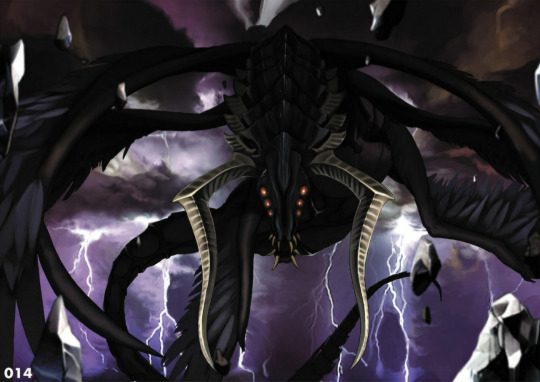
(Note: I’m using masculine descriptors for Grima because I’m personally more used to male Grima and male Robin)
Here’s another baddie I wasn’t too sure where I was gonna put on the list. I knew I wanted him on here, but again, I wasn’t expecting Grima to be so high. He’s built up all throughout Awakening, as well as turning out to be reincarnated in the main character, Robin. Already does push him up on the list. But if you were to dissect his personality, he’s really just your godly final villain, who condescends down on you.
But there’s actually a lot more to this monster than you’d expect.
At first, I see a lot of similarities between him and Duma: Cult worshipers, really powerful dragon, catalyst for a war etc. But Duma as a villain is due to the dragon deterioration. Sure, he’s got bad followers, but losing his sanity kinda enabled them. But Grima… This guy wants to wipe out all life because he can.
Grima is much more a force of nature as a villain. He doesn’t try to dress up his simplistic desire with fancy philosophy. No, he embraces just how above everyone he is and how he’ll enjoy wiping them out.
Not only that, but design-wise… Holy crap.
The sheer size and power of Grima, coupled with one of the most unique designs for a dragon, makes for a truly nightmarish foe. The boney, almost mechanical way Grima turns his head when ready to attack, just sends shivers down my spine. His size and pension for only wanting to destroy all life really gives off this sense of being an inevitability. A force that can not be stopped from washing over the world.
It really works with the overall theme of Awakening. Robin trying to forge his own identity and is not tied down to fate. But how exactly can you fight that fate when its just so intimidating? Why with friends, of course! The final moments of Robin and Chrom slaying Grima is one of the most tragic things I’ve watched. With Robin knowing he needs to die to prevent Grima, but the only way to kill Grima is with a Falchion in the hands of Chrom. So Robin must be slain by his best friend, the one he’s gone through hell with and gave him a chance at making this new life for himself. It’s a final battle that breaks my heart.
Speaking of final battles, Grima offers one of the most unique environments for a final battle. Using that monstrous size to serve as a stage for your final fight against the Grimleal on the back of their god. Not to mention the priest warping in to keep bogging you down as you try to get off that killing blow on the Fell Dragon.
The background added by Shadows of Valentia about a young Grima actually being an alchemic monstrosity made to find a way to cheat death not only elevates Grima thematic impact, but also make him more like a lovecraftian horror. Which is something rare in this series.
That said, the biggest fault in this character is hw sidelined he is. There’s nothing wrong with a simplistic villain, but even in Robin form, Grima really doesn’t take much part in the events. I would’ve liked more interactions with him and Chrom or Robin before the revival.
I also completely understand if someone doesn't care for the “kill all people in the world,” type of villain. What is the endgame after destroying everything? Guess make some zombies.
I do argue that Grima being a force of nature makes him unique to the whole point of “what happens next?” But again, as a finally boss, I can see if that’s not your style. And while I think the simplicity is kinda beautiful, I myself have a preference for more complex villains.
4. The Black Knight (Fire Emblem: Path of Radiance/Fire Emblem: Radiant Dawn)

Hoo boy, I’m not gonna make any friends with this one.
How do I even talk about this guy properly? Mainly due to some narrative… Disconnects... between Path of Radiance and Radiant Dawn. Well I’ll just try and keep with his outing in Path of Radiance.
Black Knight has easily some of the most thematic presence in the series. His anonymous name and sleek design make almost all of his cutscenes a treat. Just stepping onto the battlefield and killing Greil, with the only hint of who he is being that he was one of Greil’s former students already sets him up as an anomaly.
But something you notice quickly, Black Knight has chivalry. He offers to give Greil the legendary blade of Ragnell so they can have an even fight. Sure, Black Knight wants to kill his mentor to prove he has become better, but he’s not gonna do it unfairly. And he lets Ike keep Ragnell, so that he can truly grow as strong as Greil and then give him a true fight.
Speaking of Ragnell, I actually love how it and Black Knight’s Alondite blade are sister swords. Setting up for a rivalry that goes beyond just Ike getting revenge for his dad. It leads to a lot of interesting encounters over the course of the game, building up to a crescendo of when Ike will finally defeat the armored menace. It honestly makes for a more compelling final brawl than Ashnard.
Also with Ashnard, we come back to that whole chivalry thing. Because while Ashnard displays himself as a “Mad King,” Black Knight still honorably serves him. In fact, while I’ve seen many people debate the true identity of Black Knight, I actually like the idea that he was just a student of Greil. He needs no true identity except being an embodiment of knightly principles and power.
For all the good and bad that entails.
Leading to great parallels between him and Ike. Ike being a mercenary whose principles differ so much from the Black Knight make him an ideal opponent for the Black Knight.
Now all that said, we need to get to the big but. The actual identity of the Black Knight being Zelgius raises a lot of questions and messes with the consistency of the story. I genuinely feel like it would be more powerful if Zelgius was his own character. While the ambiguity of the Black Knight added to his.
The best moment in Radiant Dawn for me is honestly his end, where he’s at least proud to have helped perfected Ike’s swordplay. But after that, I can’t exactly say he’s the same character. And that unfortunately keeps him from being any higher on the list.
3. Berkut (Fire Emblem Echoes: Shadows of Valentia)
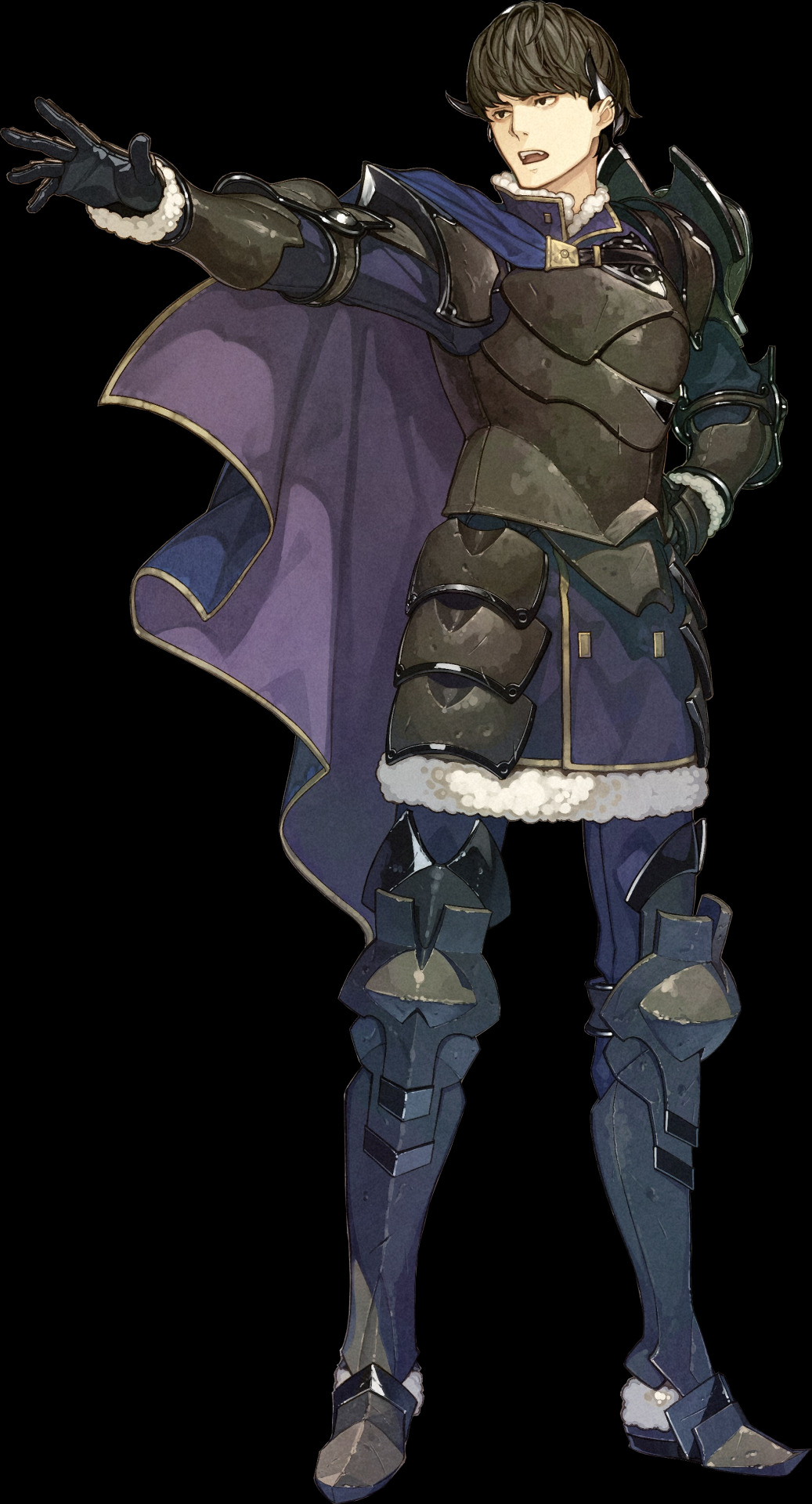
Top 3, everyone! And we’re kicking it off with the Rigelean Prince, Berkut.
After coming off Fates, there was this really big cloud hanging over the FE fandom if they’d actually be able to recover from their dip in storytelling. And then Echoes came up with the game-exclusive addition of Berkut.
Berkut really was a return to for with understandable villains. Having grown up being a noble of Rigel and as nephew of Rudolf next in line for the throne. In a society that prides itself on power, Berkut was only ever asked to be strong enough to ascend to that title of king.
And when you first see him dancing with Rinea, he really does seem invincible. Dancing in the conquered halls of Zofia Castle with his one true love as he does not need to take to the battlefield to assist in fighting the Deliverance. Only bothering to fight Alm as “sport.”
At first, he really just comes off as an arrogant Blue Blood that you wanna knock off his horse. But after he loses once and sees Alm’s brand, it just starts this downward spiral. Begging is uncle for one more chance, rejecting the help of Nuibaba’s mirror, only to use it out of fear that he might actually not be able to win against Alm.
Also, massive props to Ian Sinclair as Berkut’s english voice. As FE had started going fully dubbed, Sinclair brings such a performance as the deteriorating prince.
I like he even makes more dynamics with the Duma Faithful, believing that they’re supposed to serve his house and respect him, but Jedah counters that their real allegiance is to Duma. Tempting Berkut with his power. But Berkut himself even finds Duma’s strength disgusting.
When he finally falls after Rudolf naming Alm his true heir, so see just how low he’s fallen as he sacrifices Rinea to make his pact with Duma and use his new mystical enhancements to take out the Deliverance golden boy Alm, once and for all.
Berkut’s story is easily an ideal tragic character. Very powerful and smart, but flawed. His own fears motivating his actions as well as the constraints of his society and family pressure. Add on how he’s made that he will not marry Rinea until he becomes Emperor, as he feels that is only when he’s worthy enough, and this guy’s basically telegraphing the grave he’s about to dig himself.
No way can I undersell how much Berkut seemingly revived faith in writing for future FE antagonists as the series was still suffering from the… mixed reaction to Fates.
2. Edelgard von Hresvelg (Fire Emblem: Three Houses)
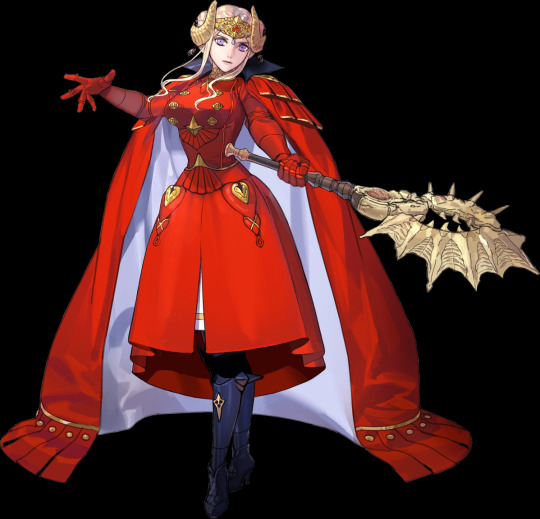
God what have I not said about Edelgard? Well if you want to read more comprehensive stuff I’ve written about her, you can find it here.
But in short, Edelgard was a phenomenal twist character. Built up slowly over the course of the game and the fact someone as high as a lord would secretly be planning to destroy the church was a shock.
Her role as the most intellectual of the three house leaders, motivated by logic and pragmatism offered a unique opposition to the over emotional Dimitri. Her being the product of crest experimentation and the second wielder of the crest of flames makes for a pretty powerful backstory. Not to mention being one of the few lords whose political system we fully get to see realize. With the multiple ministers having robbed power from her family.
Her relationship with Dimitri is also one of the sweetest villain backstories. You see the two actually sit down and try to end this and you know it’s probably only because of their shared past. The oath of the dagger of how they both have made their own paths that veer off in different directions is the first signs of turmoil that El has felt ever since her declaration of war.
And then there’s her final fight. I don’t think I have felt a more satisfying final battle than with Hagemon Husk Edelgard. The long throne room crawl as guards and monsters poured in to try and stand in your way. All whlie Edelgard tries to snipe at you from a distance with her new fireball technique.
Also if were giving points to acting, Tara Platt brings a great performance as both Edelgard and the Flame Emperor.
Now like Black Knight, the biggest flaw is a lot of minute nitpicks that really add up over the multiple routes. The Black Eagle route even seems to do away with a lot of Edelgards ambiguity. But if you stick to BL and GD Edelgard, you have one of the best antagonists in the series. Leaving me excited what FE17 has in store.
1. Arvis (Fire Emblem: Genealogy of the Holy War)

Yeah, you all knew this one was coming. The OG Flame Emperor himself, Arvis.
So for those who don’t know, Arvis was basically Edelgard before Edelgard. Having watched corrupt nobles run Grannvale for a time as well as grown up under the self destructive Duke Victor, Arvis had intended to make Grannvale a more fair world. Free of prejudice and pain.
Use the feuding lords to his advantage to claim land and renown, Arvis also stayed by the current King of Grannvale, Azmur. Earning him some brownie points. Arvis’s alliance with Manfroy and the Lopto Sect ultimately leads to him getting his chance at the throne. With Manfroy finding the long lost granddaughter (and wife of Sigurd) Deirdre, wiping her memory clean and “conveniently” leaving her for Arvis to find and fall in love with.
By marrying and impregnating the newly found prince, Arvis was named Emperor Regent by Azmur till their child came of age. However, to unilaterally have Grannvale under his control, he had to take out Sigurd in one of the most heartbreaking scenes in the history of FE, The Belhalla Massacre.
At first Arvis seems like this manipulative puppet master with delusions of conquest, but the more you learn about him and the environment he came from. Arvis truly wants to make a better and more fair world. And unlike someone like Zephiel, he doesn’t think that means wipe out all humans. You see that he doesn’t even hold contempt for Sigurd, more indifference as he regrets that Sigurd would not be able to see Arvis’s new world.
But with his ultimate tragedy being that faustian deal he cut with Manfroy ultimately led to the birth of Julius. Who, with the Major Loptous blood, would go on to not only be Loptous’ vessel, but also wrestle away power from Arvis. The tragic irony of what secured his hold on the throne being what ultimately makes him lose it. Add on some more angst as he realizes that Deirdre is actually his half sister and that Manfroy’s intention was for them to bear a child like Julius, you have easily one of the most tragic tales in FE.
We also see more of the dynamics of Arvis in the Seliph book of FE4. Actually trying to save all the children taken by Julius with Ishtar. As well as his love for his own children, Julius and Julia, going out of his way to save Julius and finally face his reckoning against Seliph.
His battle is brutal, as after what he did to Sigurd, you want to beat down Arvis with Seliph. You want nothing more but to his rule. But as you’ve gone on, you see just how much of person Arvis is. And while you want Seliph to get his vengeance, it doesn’t make the fight any easier as you are left to wonder what things would be like if Arvis was Emperor without Manfroy using Julius.
His final words to Seliph just echo in your head, making you wish there was a better way this could’ve turned out.
If there is one negative I could say about Arvis, its the fact he basically monopolizes the story for his own. His actions basically pushing so much of the narrative he eclipses Sigurd. But honestly, if we got a remake with more time devoted to character interaction in Sigurd’s army, I think it would balance out nicely.
Welp, that’s my Top 10 FE antagonists. Let me know if you agree or disagree. And if this gets enough hits, I might do similar posts in the future. Till next time, take care!
#fire emblem#fire emblem three houses#fe3h#feh#fire emblem blazing blade#fire emblem genealogy of the holy war#tellius#fire emblem blazing sword#fire emblem sacred stones#fire emblem thracia 776#fire emblem awakening#fire emblem echoes shadows of valentia#fire emblem gaiden#orson#hilda#ishtar#ishtore#bloom#friege#tine#tailtiu#jedah#reinhardt#fe5#julius#edelgard von hraesvelgr#arvis#grima#chrom#robin
20 notes
·
View notes
Text
Carrie Franchise
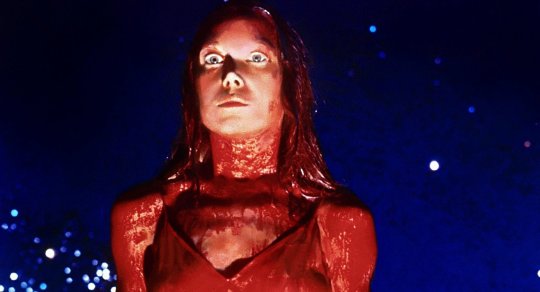
Carrie, the heart warming tale of a high school girl who sets the world on fire with her mind. I knew little else about the original film, nor that it had a sequel and been remade twice. While the original movie proved to be better than I'd have imagined, attempts to recapture the essence of the 1976 version have sadly fallen flat.
1. Carrie (1976)
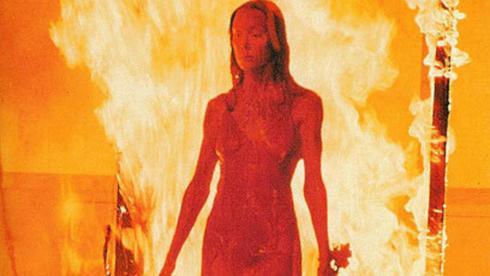
When I sat down to the original Carrie, my expectations were moderate. I knew that the movie was famous, and that the protagonist could set things on fire with her mind, but really nothing else. It sounded interesting but not earth shattering. I had no idea the wild ride the movie was about to take me on.
The opening scene, in classic seventies style, was a soft core porn in a high school girls locker room as they showered. The porn gave me whiplash when Carrie suddenly got her first period, and instead of handling it like a normal person screamed for help and grasped onto her teammates with bloody hands in a panic. The girls teased her in a sequence that can only make sense in movies, not real life, shouting for her to "plug it up" and pelting her with tampons and pads as she screamed and cried in a corner. Apparently, Carrie had literally never heard about how periods work before. This is attributed to her crazy, fundamentalist mother, but I would also like to raise questions about the state of sex ed. in schools in the seventies. I wasn't expecting much, but did they really not even go over reproductive organs for five minutes? Incredible.
The bulk of the movie is a slow burn wherein we follow Carrie, a girl who is relentlessly bullied by her peers. Not only that, but she is actually a little weird, due to her fundamentalist Christian mother who abuses her at home. Her mother says such gems as that Carrie wouldn't have gotten her period if she hadn't had sex, and that it was God's punishment. She then proceeded to lock her in a closet for several hours, telling Carrie to pray. Carrie's mother makes all of their clothes, and doesn't allow electric lights in the household, just to give the very briefest depiction of how weird it is there.
Through the movie we see that the gym teacher, and then a few others actually try to do right by Carrie. A boy asks her to the prom. They try to turn Carrie's sad life around.
Meanwhile, the head bitch of the school plots revenge on Carrie, whom she blames for her own teenaged angst. She's a terrible person.
Right in the last stretch of movie, Carrie wins the title of prom queen. Her dreams are coming true. Then the head bitch douses her in pigs blood, and a few people laugh, and Carrie totally snaps and kills everyone with her mind, including those who had tried to do right. She goes home, and her mother who believed she was possessed by the devil tries to kill her, but Carrie in turn kills her mother. The sole survivor of the night continues to have nightmares of Carrie attacking her from the grave, and it isn't clear to me whether that's delusion caused by trauma or whether Carrie continued to haunt even her from the beyond.
What a wild ride. I didn't see the ending coming at all, and the shock and chaos of it very much reminded me of Friday the 13th, and The Birds. To add to that, I'm still not certain who the true villain of the movie is. Carrie? Her mother? Her terrible classmates? All of them? None? And did Carrie's mother create her through the abuse, or was Carrie truly possessed by the devil the entire time? Her retribution, after all, was more than a bit excessive.
I enjoyed Carrie far more than I had expected to.
Final rating? 8/10
2. The Rage: Carrie 2 (1999)
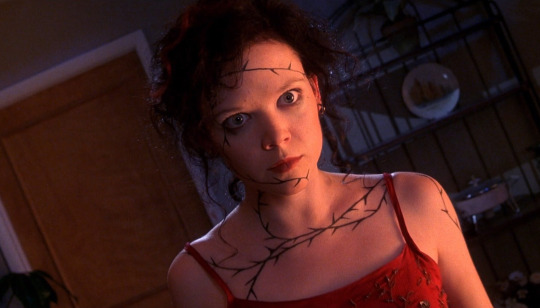
When I started Carrie 2, I was curious how they'd go about a sequel. Carrie had died at the end of the first film. Would this be a sort of prequel to her life? Would she be a ghost? Would they find a way to resurrect her, as they did Jason Voorhees so many times? In fact, it was none of these. The story follows Rachel, Carrie's half sister. Apparently their father has a telekinesis gene that was passed on to both of them, because that makes sense.
We start the movie when Rachel is a little girl. She has a religious nutter mother, just like Carrie, who is trying to banish the devil from her, because she can move things with her mind. The mother gets taken away to a psych ward and is diagnosed with schizophrenia. Is she schizophrenic? Or justified? Perhaps both.
Rachel lives with terrible foster parents, and like Carrie is unpopular. Unlike in Carrie, however, the school atmosphere is completely unrealistic. There's absolute chaos, someone running around with a supersoaker, another guy filming girls' boobs. The cheerleaders are practicing on the school lawn before school starts. I'm always astounded by how unrealistic high school is depicted in some movies and shows, considering that the writers probably attended one.
Also unlike Carrie, Rachel isn't the single social pariah of the entire school. She's just one of many unpopular students, and even has an unpopular best friend. The friend sleeps with a jock (the eldest son from Home Improvement, weirdly), and then when he casts her aside she kills herself by jumping off the roof. This, I guess, is the catalyst for Rachel's telekinesis to start spiraling out of control.
One of the teachers at the school is the sole survivor from the Carrie incident twenty years ago. She wants to help Rachel before it's too late, but that never gains any traction. She also wants to sue Home Improvement boy for statutory rape, and while he and his friends are thoroughly disgusting that felt like a bit of a stretch to me. As a result, the jocks rally against Rachel, all except for Good Jock. Rachel and Good Jock start dating, and Good Jock temporarily friend-divorces the other jocks.
The story culminates in Rachel thinking that Good Jock used her due to the influence of his friends, and she has her Carrie moment where she tries to set everyone and everything on fire. Until this point the echoes of Carrie in Carrie 2 were stupid but boring. The carbon copy ending pushed the film into the realm of terrible.
In addition to the same end scene, they even had the original Carrie mother's voice repeating "they're all going to laugh at you" in the background of Rachel's mind, just as from the original Carrie ending. Why? How? What was it supposed to imply? As if that didn't ruin the scene enough, there was a hilariously bad performance of violent acts -- such as mentally flung CDs acting as shurikens. And Rachel's heart tattoo began to beat, and the barbed wire of it spread to mark her entire body. Again, why? How?
I finished this movie wondering why they'd bothered to make it at all, and also wondering how they failed so spectacularly in capturing whatever magic it was that had made Carrie so fantastic, while simultaneously copying as much from the original movie as possible.
Final rating: 3/10
3. Carrie (2002 made for TV film)
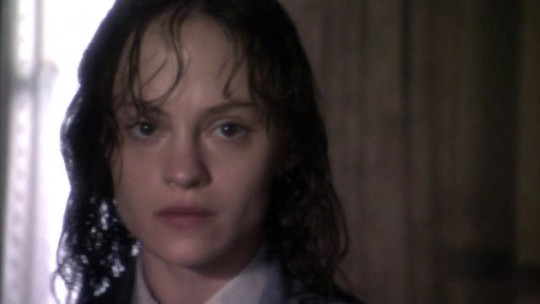
Like all good movies, it was perhaps inevitable that someone would do a remake of Carrie. I was skeptical of the 2002 made for TV movie, but I wanted so much for it to offer something unique. Some remakes actually do have artistic vision behind them. Unfortunately, it was as terrible as one might expect.
The main point to the remake, so far as I can tell, was to update Carrie to take place in a more modern setting. But what exactly was unrelatable about the 1976 film? The lack of sex education is the only real flaw so far as I could tell, and to be fair, the 2002 film does address it. Carrie opts out of sex ed. with a religious exemption. But she also lives in the world of the internet, and uses the web to research her secret powers instead of the library. Yet even with apparently websites helping her to learn them, no one else knows about telekinesis or believes what happened in the end. The modern setting, in my opinion, only built more plot holes rather than filling them in.
In Carrie 2002, the method of story telling is also different. We start off at a police station, after the main events of the film, as detectives interview students and teachers and try to piece together what had happened. I'm not sure what the point of the investigative narrative is, and in fact it threw me. In my experience, the point of having such a perspective is so that each time we're actually inside of the movie, the events we see are only told from the limited point of view of whoever is being interviewed. But that isn't so in Carrie 2002, because we frequently have perspectives from Carrie, who isn't interviewed at all, nor is she seen from the perspective of any of the interviewees. As such, the investigative angle is a weakness, not a strength.
Like Carrie 2, Carrie 2002 features a somewhat unbelievable vision of high school. Every detail, to me at least, is not quite sold. In fact, "not quite" is the theme of the movie, as every key aspect of the original film seems diminished.
Carrie's mother is abusive, but not very. She's religious, but not nearly as much so. The girls at Carrie's school are mean to her, but only to a point. The head orchestrator of Carrie's torments is almost shy in comparison to her original counterpart, and has to be goaded on by the advice of her sociopathic boyfriend. It's quite the departure from the sociopathic girl of the original movie with the whipped boyfriend following in tow.
The gym teacher does care, but she doesn't care nearly as much. The kind boy who takes Carrie to prom seems nice enough, but mostly seems to take Carrie because of his girlfriend's wishes. In the original, there was at least some foreshadowing of his kindness when he spoke up for her slightly in class.
Even the final scene of the movie felt lesser. At points it almost felt goofy, and like Carrie 2, Carrie 2002's final scene felt over the top. She kept going well after the school was destroyed, and proclaimed not to have remembered what happened when she reached home. While Original Carrie seemed to be in shock, Remake Carrie seemed to instead be purely evil, all nuance lost. Rather than the knife battle with the mother, the mother tried to drown her, and Carrie's over-the-top powers manifested again in an ability to visualize and control the mother's heartbeat in her chest.
The coup de grace as far as terrible decisions in the remake is that Carrie actually lived in the end. Sue, the girl who'd gone out of her way to help Carrie get a date to prom, showed up for some reason at Carrie's house after the massacre, and found her drowned but resuscitated her. She helped Carrie escape to a new life in Florida and didn't tell the truth to the cops. Why? I have no earthly idea. I suppose that she felt sorry for Carrie, but with the luke-warm mother and the brick-to-the-face storytelling, this film failed to manifest any of the conflicting feelings in me as the original. A final shot of Carrie shows that she's still haunted by visions of her mother and of the head mean girl, but they seem to be PTSD with no possibility of a haunting. It's a sad, pale shadow of the Carrie-haunting of Sue at the end of the original.
In the end, I'm not really sure why they felt a need to remake Carrie in 2002. Or if they really felt they must, then I fail to see the artistic vision. In any good remake, there should be some element offered that is uniquely its own. In this case, the writers failed to deliver.
Final rating? 3/10
4. Carrie (2013)
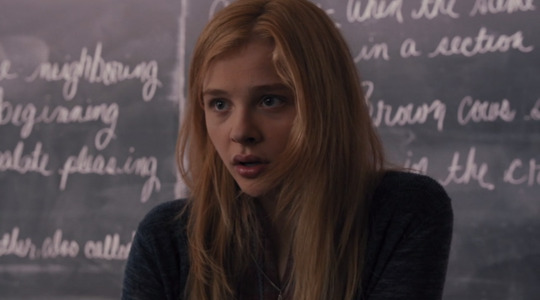
Once again, they decided to remake Carrie. Would it be as creative as the original? Unfortunately not. Instead, they made many of the same mistakes that they had in 2002.
Like the 2002 movie, Carrie 2013 is set in modern times. They give the students the internet and cell phones to make things seem more current, then randomly put Carrie in pool volley ball because somehow that's more relatable than the volleyball of the original movie. Throughout this adventure I've wondered why they've felt the need to change the sport, and am always curious to see which one it will be next. First volley ball, then softball, now the pool.
The first major misstep of this film, right off the bat, is that Carrie is incredibly conventionally attractive. No one can beat the sort of awkward and strange look of the original actress, although the casting in 2002 wasn't too bad. But in 2013, for some reason we get a completely normal, or even above average looking girl who can have no makeover on prom night, as she already looks amazing. Not only is the aesthetic off, but she fails to deliver the awkward mannerisms that go hand in hand with the character of Carrie.
Next, we come to the iconic opening scene, which as in the 2002 remake remained mostly intact. However, in Carrie 2002 the only truly redeemable thing was that Carrie's lack of sexual education had been explained by a religious exemption. For some reason, in 2013, we no longer have any excuse or idea how she has no idea what a period is. In the modern day setting, this is all the more difficult to swallow.
The writers seemed to want to correct a few of the 2002 mistakes: the head bad girl was more cacklingly evil, the good jock was once again good in his own right and had a little foreshadowing. But they kept some of the mistakes as well -- the bad girl's boyfriend being a criminal, and most notably Carrie's overpowered telekinesis. In 2013, it's probably more overt than ever before, as Carrie deliberately practices floating books around her, though perhaps it's not as spectacular as the random meteorites striking inexplicably in either Carrie 2 or 2002, I can't remember which.
Much like in its 2002 predecessor, Carrie 2013's mother has been reduced. She's not nearly so abusive as the original 1976 mother, instead turning much of her abuse inward, as she's seen slapping herself, and banging her head against a wall. She's also not as extreme in her rejection of electricity as in 1976. All of this -- the more pathetic mother, the stronger Carrie, serve to lose all the nuance of the original film. I'm not left thinking that everyone -- the school bullies, Carrie, and her mother -- are terrible. Instead, it read a bit like a '90s slasher film in the end scene, as Carrie spread her arms into the air like a caricature of a witch while she mentally flung things to and fro. Gone was the echo of the mother's voice in her head, and instead it was a rather boring scene, with none of the detached horror that I've come to associate with Carrie.
In fact, when Carrie arrived home after the devastation, she was visibly upset, bursting into tears and calling for her mother. That's a far cry from the original Carrie that had arrived at her home in a kind of stupor, washing herself methodically as if in shock or perhaps still possessed.
One improvement over the 2002 film was that they did kill Carrie as in the original. But one misstep? They still needed Sue Snell to make a final appearance in the final destruction. To what purpose? So that Carrie could tell her with preternatural ability, that she was pregnant. Why add this to Carrie's powers? Why have this scene at all? And instead of Carrie simply haunting Sue's thoughts as in the 1976 original, now she seems to be possibly, somehow, haunting Sue's baby. It's a ridiculous decision and I have no idea why they made it.
Final rating? 2/10
3 notes
·
View notes
Text
Les Misérables 2018, Episode 1
So I guess all the cool kids are doing episode reviews, huh?
As I’ve said, we can’t properly evaluate this adaptation until we find out whether Gavroche makes fun of Enjolras’s beard, but here are my thoughts so far.
The Good:
• Merging the timelines so the narrative can follow all three protagonist groups simultaneously was a brilliant adaptation decision. It slightly borks Fantine and Cosette’s timeline, but it was so, so worth it because it solves the “my second protagonist iz pastede on yay” problem that afflicts so many versions of Les Misérables, including the Brick. I understand why Marius is there, but I’m not convinced Hugo’s audience cared even at the time, and if they did 50% of his narrative purpose evaporated at the Battle of Sedan. If Davies wanted to do a reasonably faithful adaptation that gives Marius equal time with Valjean he really needed to address this problem somehow, and he did, and it works. The intercutting was maybe a little faster than ideal, but this was an inspired choice.
• This adaptation has the best sense of place of any I’ve seen, including the 1934 French one which was actually filmed on location but didn’t really believe in establishing shots. The bagne was extremely well done, Digne looked like Digne, Paris was passible.
• The Pontmercy/Gillenormand group were FLAW FREE. Baby Marius was adorable, Georges was hot and sad, Gillenormand was a flaming pile of royalist trash. I felt like this adaptation really got him in his horrible Ultra soul. These are far and away the best English-language Georges and Gillenormand we’ve ever had, and possibly the best of all time.
• Nicolette is the hero of this episode apparently? I am very okay with this, and I feel like Hugo would be too.
• Favourite was great. OOC, but great. 2018!Favourite can stay.
I’m very unconvinced by the “If Fantine had real friends she wouldn’t have so many problems” criticism I’ve been seeing. Real friends are up for giving you sound advice like “These guys are not marriage material; don’t fall for this ‘I’m a ~poet~’ bullshit” and “Use the tour, Fantine; that’s what it’s there for.” They are not up for subsidizing your poor family planning choices for more than a decade until your baby is old enough to bring in a wage. They might be able to club together to cover Fantine’s rent for a quarter – and perhaps they do; she doesn’t leave Paris until Cosette’s a toddler – but they’re living on the margins themselves. Favourite is canonically supporting her mother. Ultimately they have to be saving so they have the capital to form their own households. This is a classic “secure your own oxygen mask first” scenario, and Fantine’s situation is not something they are equipped or morally obliged to handle.
• Good English accent decisions, more or less.
• The costuming was pretty decent. The bagne uniforms were very, very good.
The Meh:
• So far I am not a fan of the interpretations of either Valjean or Javert in this, although their character-defining scenes won’t come until Montreuil.
That said, I think Valjean’s extreme aversion to violence post-redemption tends to eclipse in people’s minds the bit where he stood over Myriel’s bed contemplating whether or not to stave his skull in for no fucking reason, which was also a thing he did in the Brick. The fact that we’ve never seen him act violently doesn’t mean he was incapable of it. He’s clever and good at exploiting an opportunity, and at that stage of his life he hates the world in general and the bagne guards in particular an awful lot. The “rocks fall, guards die” sequence is not an adaptation choice I like, but I think it’s a defensible one.
Likewise, Smugvert is a time-honored tradition even if it’s one I find trite and point-missing, and Oyelowo is clearly having a ball with it, so you do you, 2018!Javert.
• Myriel was neither great nor bad, although shoutout to Mme. Magloire for that “Was all that silver really ours in the first place?” “Yes, of course it was!” exchange.
• Baptistine and Mlle. Gillenormand apparently don’t exist in this adaptation? I’m choosing to believe they ditched their controlling relatives and ran off together to have fabulous lesbian Catholic zealot adventures somewhere.
• There was a shitload of Tholomyès in this. He was perfect, but there can be enough of a perfectly adapted thing. In Tholomyès’ case “enough” would probably be around 30 seconds’ worth. I jest, but I think there’s some merit in the criticism that we were seeing the relationship more from his perspective than Fantine’s. It might have been better to spend more time establishing the dinginess and drudgery of her daily life prior to becoming his mistress, and less time on him.
• Starting with Waterloo makes the Pontmercys the primary leg of the Valjean/Fantine+Cosette/Marius stool. On some level I guess that’s fair enough, since they never get their fair share of attention in adaptations and they’re the thing this adaptation is doing best, but it’s very odd.
• I don’t loathe the French background dialogue, but neither am I convinced it was a good idea.
• I’m still a bit annoyed about the inaccuracy of the bagne chain situation, although I think there are actually sound narrative reasons for not giving Valjean a chainmate.
• For an adaptation written by a guy who hates the musical, this miniseries sure seems convinced that the guards only address the convicts by number, and very keen on having Jean Valjean shout his name at regular intervals. None of that is from the Brick.
The Bad
• The red location titles. WHY.
• We shall not speak of the women’s hair.
• Not to kinkshame the Telegraph but we understand people in history had the same bodily functions that we do. It’s not actually necessary to watch them perform them.
• There were some really odd decisions about how to allocate screen time: the timeskip sky montage, picking up Valjean’s nighttime wanderings after he’d been denied a place at the inn rather than spending 30 seconds to show him getting chucked out, some of the grisette scenes.
• Some of the complaints about the dialogue seem unjust to me, but some of it was... not the best.
• I’m happy to accept a pre-redemption Valjean whose antisocial hostility is a matter of firm conviction rather than a vague, inchoate resentment, but even under those circumstances “YAAARGH!” is not an appropriate response to someone you just tried to rob giving you expensive candlesticks.
• Likewise I am happy to accept that the robbery of Petit Gervais was a deliberate act, and possibly a sort of fuck-you directed towards Myriel’s decision to buy Valjean’s soul and sell it to a third party without his consent after nineteen years of people doing shit to him without his consent, but if Valjean’s not in a fugue state running about two feet down the road half a minute after the kid is out of sight does not constitute an adequate attempt at restitution. This would have been a good moment for a timeskip sky montage.
On balance, pending the Judgment of Gavroche, I think this adaptation is fine. It’s not doing what I want with my favorite characters, but I got my Valjean and my Javert in 1978. It’s only fair the Georges Pontmercy fans should get their turn.
18 notes
·
View notes
Note
I'm not doubting you about the 'cs lewis wasn't racist' but can you share the receipts so that I can use them when people argue w me about this?
Absolutely!!!
The thing about the racism claim is it’s mislabeling what Lewis truly did. Do I approve of how Lewis portrayed the Calormene as a whole? No. But is it racism? Not at all. What Lewis shows us is more of a cultural insensitivity which is still common to this day. There’s a really big difference between cultural insensitivity sprung up by ignorance and just straight up racism. And labeling everything racism really begins to dilute the meaning of the word until it hardly means anything to anyone it should impact.
So, to start: the meaning of the word racism. The Merriam-Webster dictionary defines it as “a belief that race is the primary determinant of human traits and capacities and that racial differences produce an inherent superiority of a particular race,” race being defined as “a category of humankind that shares certain distinctive physical traits.” So now we know what we need to look for.
Knowing the definitions, if you actually read The Chronicles of Narnia thoroughly you’ll see that racism isn’t brought up and that any prejudices against the Calormene people doesn’t have to do with their skin color or their culture (at least, their culture as a whole). What I mean by the culture “as a whole” is that while Lewis isn’t prejudiced against the whole of the Calormene people, he does make some differences between Calormen and Narnia to make Calormen the foil for Narnia, specifically in the religious aspect.
What a lot of people can’t seem to wrap their heads around is the fact that Lewis was Christian and he really did try to incorporate Christianity into his books (although into Narnia unintentionally at first) and while I see that a lot of people understand this to a degree, they don’t fully comprehend it and don’t really see it in his writings. With the Susan aspects, people think that because Lewis is a Christian, he’s saying that femininity is godless and in turn that makes him a sexist because women can’t be feminine. All of that is untrue.
In the aspect of the Calormen religion, Lewis didn’t make them a nation of “non-Aslan believers” just to hate on them and their faith. Lewis grew up in a Christian household, lost his faith during his early adulthood, became a pagan, and when he returned to Christianity he was “kicking, struggling, resentful and darting his eyes in every direction for a chance to escape” (Surprised by Joy: The Shape of My Early Life; 1955). Lewis knows different faiths, he’s not some guy who spent his entire life as a steadfast Christian with no doubt in the world and one to ostracize non-Christians. He doesn’t look at the Calormene in a hateful, anti-Christian view, but instead as a people that believe in what he thinks to be the same things as the Narnians just differently (I’ll get into what I mean by that in a bit) and are ruled by poor leaders (at least that we see of in the books, I don’t remember clearly if Calormen ever had any very admirable leaders that were liked throughout Narnia).
What I like about Lewis is that he acknowledges that question of “if I believe in x deity, what happens to the other people that believe in y deity?” (it’s such a deep and philosophical question that any theologian asks themselves at least once in their lifetime and a great use of soteriology). He not only acknowledges that deep theological question but also basically states his whole view of Calormen in this one quote from The Last Battle:
“I and [Tash] are of such different kinds that no service which is vile can be done to me, and none which is not vile can be done to him.”
This basically means that those who worship Tash and are virtuous and good people are actually worshiping Aslan, and those who are immoral and who worship Aslan are in fact worshiping Tash. So, not only does this establish Aslan as a greater and mightier being in the Narnia universe (considering all of the other minor deities, I see him as God but with a Zeus-like council of other gods, more Mount Olympus-esque) and Tash as the more evil of the two (I don’t think he’s necessarily Satan but more of a hateful being) but it also shows that Lewis doesn’t view the Calormene people as villainous or even erroneous for their faith in Tash, more as if Tash was just their Calormene name for Aslan (as God has several different names depending on the language). It also doesn’t make the Calormene people villainous, only full of people who could be virtuous and people who could be immoral as any kingdom in any place could be. He essentially humanizes them and addresses gray areas instead of making it all black and white by having one people be good (the Narnians) and another be bad (the Caloremene).
Seeing as Lewis really heavily focuses on the Christian aspect of his books, I really do think it resonates in his books that he doesn’t have this whole idea of “these are the Christians and these essentially are Satan-worshipers” especially how he took a lot of inspiration for Calormen from the Middle East and bits from Central Asia.
Why I include this argument is because there are arguments against the Calormene faith being seen as one of the major points in the counterargument for Lewis’s alleged racism. Seeing as Calormen is inspired from the Middle East and the Middle East is predominantly Islamic, a lot of people also see this as rather perverted anti-Islamic propaganda. Which is wrong. Because the only reason why the Calormene religion would be at all similar to Islam is because of any influence pre-Muhammad religions may have had on Islam which more so boils down to culture and less to actual belief systems. I remember reading once, I can’t pinpoint exactly where, most likely on the Wikipedia page of something to do with Calormen or The Horse and His Boy, that the Calormen religion is most likely influenced by early Canaanite and Carthaginian religions, the Carthaginian religion just being more of a Phoenician continuation of the Canaanite religion. This makes sense since all three religions are polytheistic and require sacrifices, specifically of the human kind (although last I read, it hasn’t been completely confirmed that human sacrifices were done for the Canaanite religion; it’s been confirmed that the Carthaginian religion did, in fact, practice human sacrifices, even that of children) and the Calormene religion even follows how the Canaanite religion was polytheistic yet monolatristic (this coming from the word monolatry which is the belief of many gods, i.e. polytheism, but with a more consistent worship of only one deity). I believe the reasons why the Canaanite and Carthaginian religions are more likely to be Lewis’s inspiration for the Calormene religion were because of G.K. Chesterton’s book The Everlasting Man (a book that Lewis wholly admired) and E. Nesbit’s depiction of Babylon (this I especially see in Lewis’s cultural development of the Calormene in their use of “Tisroc” as the name for their ruler, and their use of “may he live forever” whenever the Tisroc is mentioned).
Now, to move away from the religious aspect, Lewis really doesn’t portray any racism because there’s no hate against the Calormene people coming from the Narnians (who the narrative paints as a great nation with few flaws when controlled by the Narnians or the Pevensies). When Susan and Edmund go to Calormen in The Horse and His Boy, they don’t portray any racist ideologies. They’re not hateful toward any of the Calormene, they’re not grossly rude. They just find it an odd kingdom and that’s about it. It’s different from Narnia, Narnia which is full of what should be mythical creatures and talking animals and few humans.
The Narnians and Archenlanders happily accept Aravis, a Calormene noblegirl, and even marries Cor, a boy who seems to fall more under that European-inspired ethnicity. Not only did Lewis write Aravis out to be a heroic character, she’s also in a mixed relationship which was still heavily frowned upon and unaccepted in 1954 when the book was published. Nowadays we don’t blink at an interracial relationship (well, most of us anyways) but just to put it into perspective, the Supreme Court of the United States didn’t legalize interracial marriages throughout the entire U.S. until 1967, over 10 years after the case of Loving v. Virginia which actually imprisoned a white man and a woman of color (she identified as Indian-Rappahannock but was reported as also being Cherokee, Portuguese, and African American) for marrying because it was against Virginia’s anti-miscegenation laws. So, it’s pretty obvious that Lewis was very ahead of his times in that one aspect that seems so minuscule to us now.
On to other Calormene characters that were depicted well, we also have Lasaraleen and Emeth. Lasaraleen is a frivolous girl who cares more about dresses and dinners than fighting but she’s not evil. She’s not seen as less than the Narnian or Archenlandan(?) characters because of her skin color. She’s scared and frivolous but a good friend to Aravis who helps her escape Tashbaan so that she can continue her journey to Narnia. Whether you see her personality as being sexist is a different argument, but it’s blatantly obvious that Lewis doesn’t see her in a racist manner. She can actually be a bit admirable if you like that she pushed through her fears to help a friend escape to safety.
Emeth is one of my favorite examples as to how progressive and forward-thinking Lewis really was and this is going to veer a little bit away from the race aspect but it’ll really emphasize what Lewis was truly trying to do with Calormen by depicting it the way he did. Emeth is a Calormene officer who is very devoted to Tash, which Aslan later reveals to actually be a devotion to Him through his noble motives. By having Aslan accept Emeth into His Country even though he believed he was worshiping Tash in specific, Lewis is depicting Inclusivism. Inclusivism has two fields of thought which basically boil down to either a) the Traditional kind which states that a believer’s own views are absolutely true and believers of other religions insofar as long as they agree with that believer or b) the Relativistic Inclusivism which states that there are Absolute Truths and while no living human has yet to establish those Absolute Truths, all of humanity has partially established those Absolute Truths. I’m going to say that Lewis leans more towards the Relativistic Inclusivism in terms of Emeth. For more conservative and traditional Christians, it’s such a wild ideology to follow and has actually caused controversy within the Christian community for Lewis to have put into his books. I don’t think it helps that Emeth’s name means “truth” in Hebrew and was probably Lewis’s way of saying “this is what I believe to be true.” What I’m trying to say with all of this is that Lewis could have used a pagan white-European-inspired kingdom to depict this ideal, he could have made up a kingdom that was Viking- or Anglo-Saxon or whatever-inspired to depict that idea of Inclusivism. He could have completely left out Emeth from the plot and have used a different moment or a different book to portray Inclusivism. And yet he didn’t. He purposely chose a good man from a Middle Eastern-inspired kingdom who believed in a deity from a polytheistic yet monolastric faith and used him as an example for an ideology that’s not anti-Christian due to it’s actual Biblical support yet still so controversial within the Christian community.
I think that’s all I’ve got for now. It feels like I’m picking out small things but with Lewis he didn’t seem to write anything he didn’t feel was important to the plot (and actually important, not J.K. Rowling-type “important”) so there’s not much to actually go on in terms of anything Calormene. I think the reason why people want to claim racism is because nobody wants to delve deep into Lewis’s writing because they’ll end up face-to-face with his ideologies and they’re not easy more many people to stomach, whether Christian or atheist. They’re radical in Lewis’s veracity in his belief in them but they’re so non-traditional and more progressive than most of us in the twenty-first century will claim to be. I know there are a lot of people like Philip Pullman, who’s an outspoken atheist critic, and J.K. Rowling, who will say that they get that his Narnia books are Christian but won’t take the time to dissect it as a Christian piece and instead take the stories out of context and put it to modern day standards. I don’t know if it’s just because he’s a Christian writing in the mid-twentieth century, apparently too close to our times and ideologies and too far from the more conservative and bigoted ideologies of the earlier decades and centuries for us to be able to put his books up to our current views and standards, but I know for sure if someone like Jane Austen had written anything like the Narnia books, there wouldn’t be such an outcry for racism and sexism and etc. I mean, look at Oscar Wilde. He’s idolized for his literature and his sexuality yet everyone brushes over his gross antisemitism.
Anyways, I’m rambling and this has already been long enough. I hope this helped! If I find anything more that I can add to this argument I definitely will. If you have any more questions or there’s something else you want to ask about, you’re totally welcome to as well!
129 notes
·
View notes
Text
Series Review: Read or Die (R.O.D. the OVA)
Welcome to another episode of Paul is Weeaboo Trash! Today’s topic is a show I’ve previously seen one episode of, so long ago that I’m almost going in fresh: the OVA (what we in the US would call a “direct to video release”) of Read or Die (2001–2002)! I was lucky enough to grow up in a household where education and fun were not portrayed as opposites, and we had the means to find plenty of fun educational things to do. My parents searched for all kinds of potentially interesting activities, and living in southern New Hampshire, the Boston area was not prohibitively far to go for them. And so I was signed up for Splash, a program one weekend per fall in which MIT students teach middle- and high-school-age kids seminars on a wide variety of topics.
What counted as topics worthy of education was quite broad, however. I ended up in a "class" that consisted of watching one episode each of several anime that the student running the class was a fan of. This was back in the days where anime fandom spread person-to-person by recommendations and there was more emphasis on developing a background knowledge of "classics" among the more informed and/or snootier fans. (I still feel this way a bit because certain tropes and references are so common or influential that being familiar with the original sources can make newer shows suddenly make a lot more sense, but I disapprove of the gatekeeper tendency to look down on people who don't yet know the things "everyone knows".)
I don't remember how many shows we sampled there, but the two that made an impact were Hellsing, which in retrospect was at best questionable for the age of the audience, and was very much not my thing because I have a low tolerance for gore, and the topic of this post, Read or Die, which was very much the kind of thing I wanted to see: a nerd being a badass in a fantastical way. Especially since I was also really into James Bond at the time, so I was probably primed to eat up other media involving a British spy fighting a mysterious secret organization. Since I'm incredibly averse to media piracy and had no clue where to buy anime, though, I never followed up to finish watching it, and eventually it faded from my mind. Until I stumbled across the first volume of the manga for super-cheap at Saboten Con last year, and it flicked some nostalgia switch that reminded me how much I'd enjoyed it at the time, although I barely remember any actual details, so I am practically going in fresh here.
Read or Die follows Yomiko Readman, a teacher, obsessive book collector and reader, and superpowered secret agent who can manipulate paper in nearly any way. Any paper available, from money to ribbons to a briefcase full of blank looseleaf she apparently just brings with her. She uses this power in the course of her service as a secret agent, codename The Paper, working for the British Library?! Along with Miss Deep, who can selectively phase shift, and Drake Anderson, a gruff and dismissive military type (and apparently potter in his cover job), she is assigned to a plan to save the world in a way that vaguely involves collecting books. Saved from whom? The I-jin, clones of historical geniuses with superpowers related to their areas of expertise, such as... knowing stuff about insects, or... uh... spreading Buddhism to Japan... who are going to flashy and violent lengths to steal books the British Library is trying to acquire legitimately. Trust me, it eventually gets explained, and the Big Reveal, although pretty goddamn weird, fits in with the rest of what has been established. Suspend your disbelief enough to accept the I-jin at all, and it’s fine, although still a bit ludicrous.
And I submit that all that is still less weird and ridiculous than your typical superhero or spy movie, and this show does after all have elements of both genres in one. Or, well, more and more superhero and military action as it goes on. Although the theme music uses 60s guitar sounds, chromatic chord changes, and blaring brass hits that are virtually guaranteed to evoke the James Bond theme, and our main cast do work for a secret intelligence agency, they are in quite open military-style conflict with the I-jin -- with the approval of the UN -- and very little that’s actually covert occurs, with the notable exception of something I can’t spoil that happens at the end of ep. 2. And because of the superpower angle, some of the instances of weirdness are not flaws at all but pretty creative implementations of the characters’ powers (using a paper airplane as a lethal weapon?!).
This last point didn’t really fit in organically, but I'd also like to mention a couple of things about the art that I love but don't see often. The very first shot of the series uses multiple flat backgrounds at different distances moving in relation to each other to convey the camera moving across the scene, which I have seen in other animated works (at the moment, I can only think of examples from very old Disney movies off the top of my head), but not in recent ones. I don't know whether it's simply out-of-fashion or this is a result of the shift to CGI so animators figure "why would we do this when we can actually render a city with realistic perspective?" This show also has a particular kind of fluid motion in characters that I’ve seen in many reasonably-high-production-value shows from the 90s and 00s, but rarely in newer shows (Space Dandy being a notable exception). Maybe I'm watching the wrong recent shows, maybe it's just a stylistic choice that's out of fashion, maybe it's harder to pull off convincingly when you're not animating by hand.
I’m glad I finally got to watch this. It’s even better than I remember. Now to get to work on the rest of the manga and the other series. Oh yeah, haha. The abbreviation "R.O.D." stands for both "Read or Die" and "Read or Dream", which are different parts of the same larger series. The Read or Die manga (4 volumes), this OVA series, the Read or Dream manga (also 4 volumes), and a 26-episode TV series all take place in the same narrative universe, rather than the usual model of the anime being an adaptation/retelling of the manga. There is also a light novel series I know nothing about, but it sounds from the Wikipedia article like that is the single ongoing series that is the source for the two manga and two anime. (There is also apparently a barely-related future side story manga.)
-----
W/A/S: 1/3/3
Weeb: I don’t think there’s much, if anything, in here that would require explanation to a typical Western audience and which isn’t also explained in the dialogue.
Ass: There is a single implied nipple in the opening sequence. Gasp! And Miss Deep's costume design is pretty fanservicey, but only barely more explicitly so than you're likely to get in American media deemed suitable for older children.
Shit: Until the Big Reveal, it's just unclear why anyone involved other than Yomiko should be this interested in acquiring the specific books that serve as the show’s MacGuffin, nor is it clear that the I-jin’s plans extend further than searching for them in a very destructive way, leaving me baffled that the Library immediately makes the connection that the books are key to saving the world. There are a few minor errors in the subtitles and a visual glitch (Blu Ray remaster, please?), and a couple of places where faces just... don’t... look right. Oh, and if you’re watching the dubbed version, add another half point of Shit for Crispin Freeman’s British accent.
And for the first time I feel the need to add a CONTENT WARNING. Usually, I think the review is sufficient to give you the idea whether there is anything likely to be disturbing in a show, but this is different, because the first two episodes have the sort of over-the-top stylized combat you might expect from other action anime or Western superhero media, where even a death comes off as un-shocking. But in ep. 3 of this, there is a shocking pivot. There are several short instances of graphic and sudden violence of kinds that are quite a bit more disturbing and distressing (even when they involve the use of powers) than anything that occurred previously.
-----
Stray Observations:
- Yes, those of you who know a little Japanese caught that joke: "Yomiko" could be loosely translated as "read girl". Her name is "Read Girl Read Man". Because she likes to read. Get it? Ha! Ha! Ha!
- In the manga, Yomiko is also established to be a literal bibliophile. As in "books, regardless of content, turn her on". I'm kind of glad this is not a plot point in the anime.
- The “secret” operation in the last episode, which is conducted with UN approval and involves an actual military attack with an actual goddamn naval fleet (and collaborating with North Korea to keep the US too distracted to notice it, even though this is a British operation against an organization that literally burned down the White House in the first scene of the first episode) might actually beat the first few episodes of Full Metal Panic! for “worst undercover operation ever”.
4 notes
·
View notes
Text
more TotA blabber
- I forgot to mention this and a couple of other things the first time around, but- Wow, this game is kind of in love with pseudo psychology bullshit. Guy’s phobia of women based in this traumatic past event. Arietta being raised by wolves. Or ligers, i guess. Even Luke’s child development stuff is super bullshit, lol. idk, it’s not like I hate it, but you can feel the kind of bizarre pop culture psych things that went into this.
- On the subject of Guy’s phobia... upon replaying I am kind of uncomfortable with a couple aspects of it. First that, like, every rando woman in this household flung themselves on him as human shields to be slaughtered is a bit objectifying in a pretty violent and terrible way from a meta perspective. Not that a woman sacrificing herself for a man can never be done right. But it’s kind of creepy to me in this mass fridging kind of way. And then also the narrative seems really invested in, like, curing Guy. And I understand that from the perspective of it seriously hindering him from doing important things like saving Anise, but it’s also a bit creepy from the perspective of, like, ‘must make myself like woman. must be straight.’ :/ Not that I have a problem with Guy liking woman or shipping him with them just... yeah. Canon itself could chill a bit.
- Also the issues that Luke has killing other people is kind of waved to the side and... wtf? Like, one minute he’s having a mental breakdown over it, and the next time we run into human enemies on the ferry to Baticul it just... never comes up. While I believe pretty unreservedly that killing is bad and shouldn’t be sanctioned for war or other similar purpose, I can understand where Tear and Jade are coming from. It’s hard to predict when leaving someone alive will only cause more suffering in the end. And I realise that Luke has a lot of difficulty at that point in the game taking responsibility for things, including deaths, that are kind of inevitable but... I think the game kind of cuts this plot short by making it about Luke being some form of immature and weak instead of- yeah- killing people is fucking bad, so... wtf???
- It kind of interests me how the relationships in this story go, lol. compared to the really haremy kind of stuff that starts out with a bunch of tsun girls that slowly warm up to you and start wanting your dick, it’s kind of interesting that this game started with a spoiled noble that every girl wants to get with, and then basically weeds Natalia and Anise out through a combination of mistaken identity and misaimed goals and shitty behaviour on Luke’s part. Not that it’s, like, sooo much better or less sexist than other stuff. But it’s an interesting contrast.
- But Asch complaining about ‘Ladies Man’ Luke was so classic. omg. what a jealous nitwit. i love it.
- I keep thinking of Nephry being kind of chilly and unemotive, basically like Jade but with a better sense of morals and empathy for others. But, man, during the first meeting with her she’s so emotional... I mean, I understand why: she’s got a brother she loves but doesn’t trust and thinks he’s dead and then he shows up on her door with no warning at all. And she has all these terrible thoughts and feelings about what’s happened in the past and nobody to talk to about it with, so then she vomits it on Luke. But it was kind of jarring for me combined with some really bad voice acting, omg.
- Also I read in a let’s play that the only canon evidence of Peony -> Nephry in the games is during the Rappig Quest. But, like, I walked into Keterburg and nobody could shut up about how hot Nephry was and how Emperor Peony’s first wuv lives there and then we meet Nephry and, lo and behold, she’s super HOT. So how much evidence do you guys fucking need spoon fed to you for this onesided shitshow to have canon traction, smh. (We all know I just have a hateboner for ppl ignoring Nephry and shipping Jade and Peony, lol)
- Yeah, I was kind of patting this game on the back for not being overly exploitative with the girls’ character designs too early. I guess the tone of the game changes a bit post-Akzeriuth, so that explains suddenly why there’s such an influx of MELON jokes about Tear. MELONS. Poor Tear...
Also just this image for Tear’s Mystic Arte:

That garter belt shot... mmm... fuck. I have no standards.
- Also, got a decent image of the book in the Order of Lorelei library that has everyone’s rank:
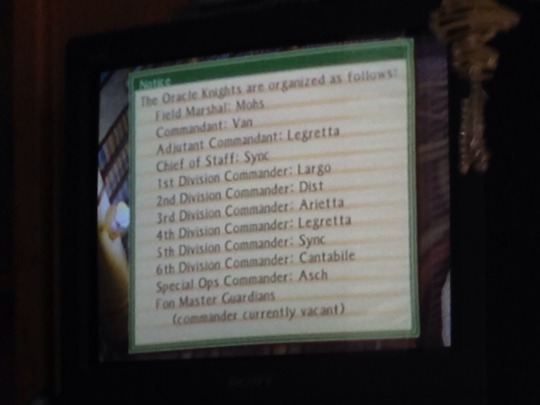
Got a mention of that mysterious Cantabile that’s the 7th God General we never hear about. What an interesting lady.
But mostly I’m just in shock that Sync, of all people, is Chief of Staff. lmao, the most nihilistic uncaring bastard ranks above Largo and Dist and Asch, haha. I need to write something about that.
- I guess I forgot how much I was glued to the sidequest FAQ the first time I played this game, smh. I ended up locking myself out of completing the Frings/Cecile sidequest, which really pisses me off, smh. I remember really enjoying this sidequest the first time and Frings untimely DEATH. So I’m disappointed I’m missing it now. Watch me get over-invested into forced and unnecessary and completely optional tragic het ships.
- (Also missed the Collector’s Book aaaaaaaa.)
- Kind of touched on it in that other post but, wow, this game sure does have a lot of angst and death and dying for a game whose general aesthetic is ‘yay! i cooked an apple pie after battle!!!’ Maybe that’s why I’m leaning away from being able to write comedy about it, lol. But I should. Apple pie is... good.
2 notes
·
View notes